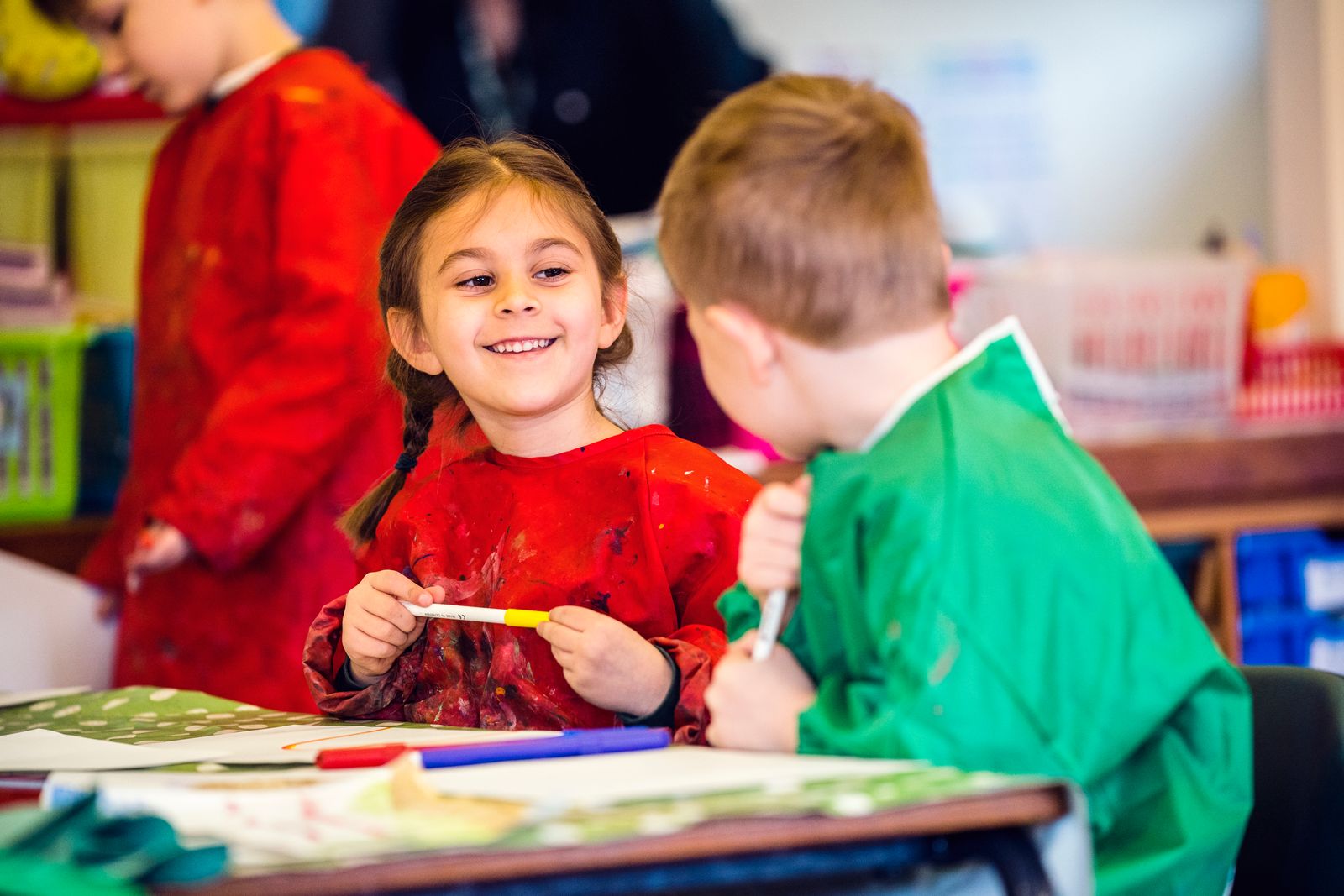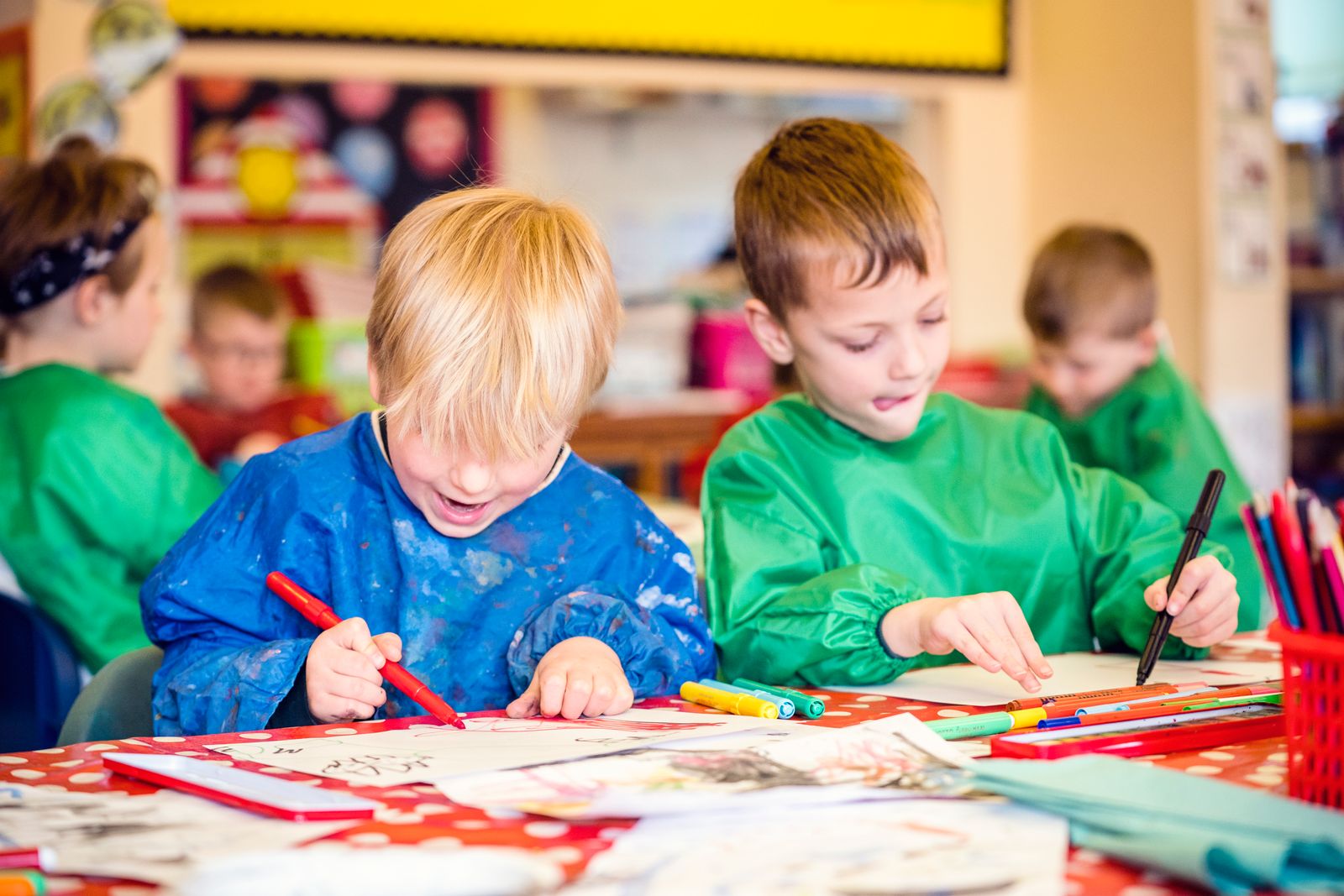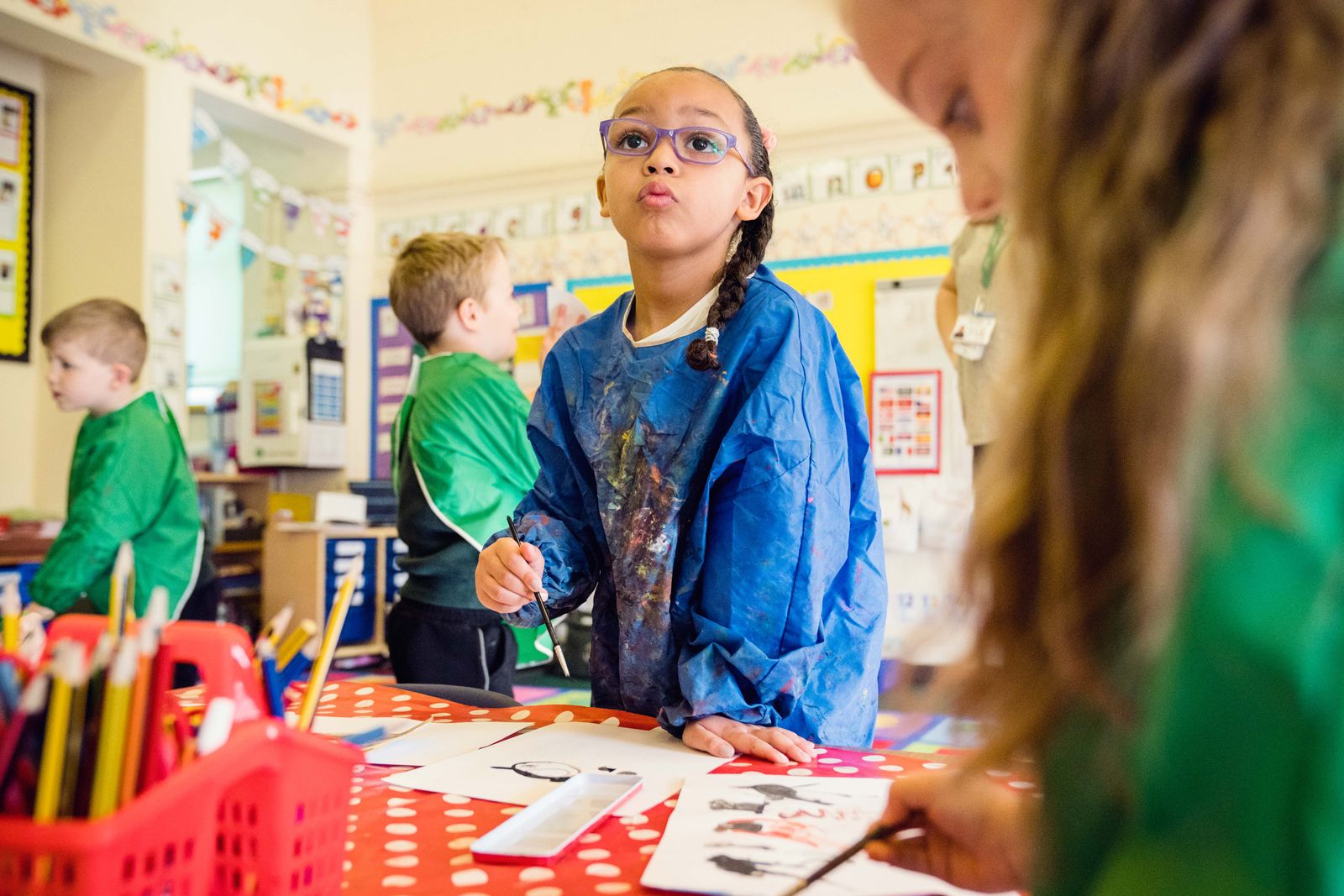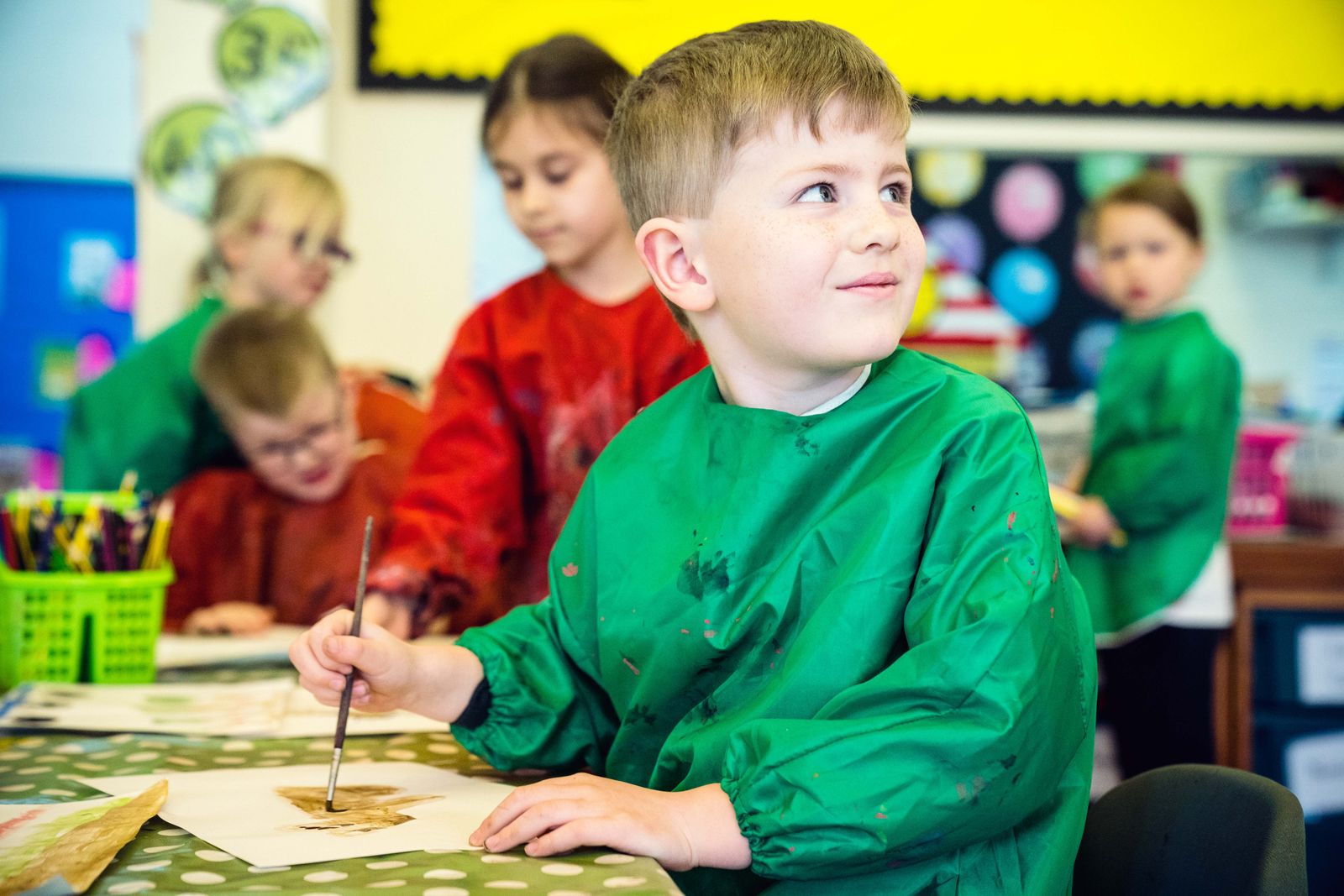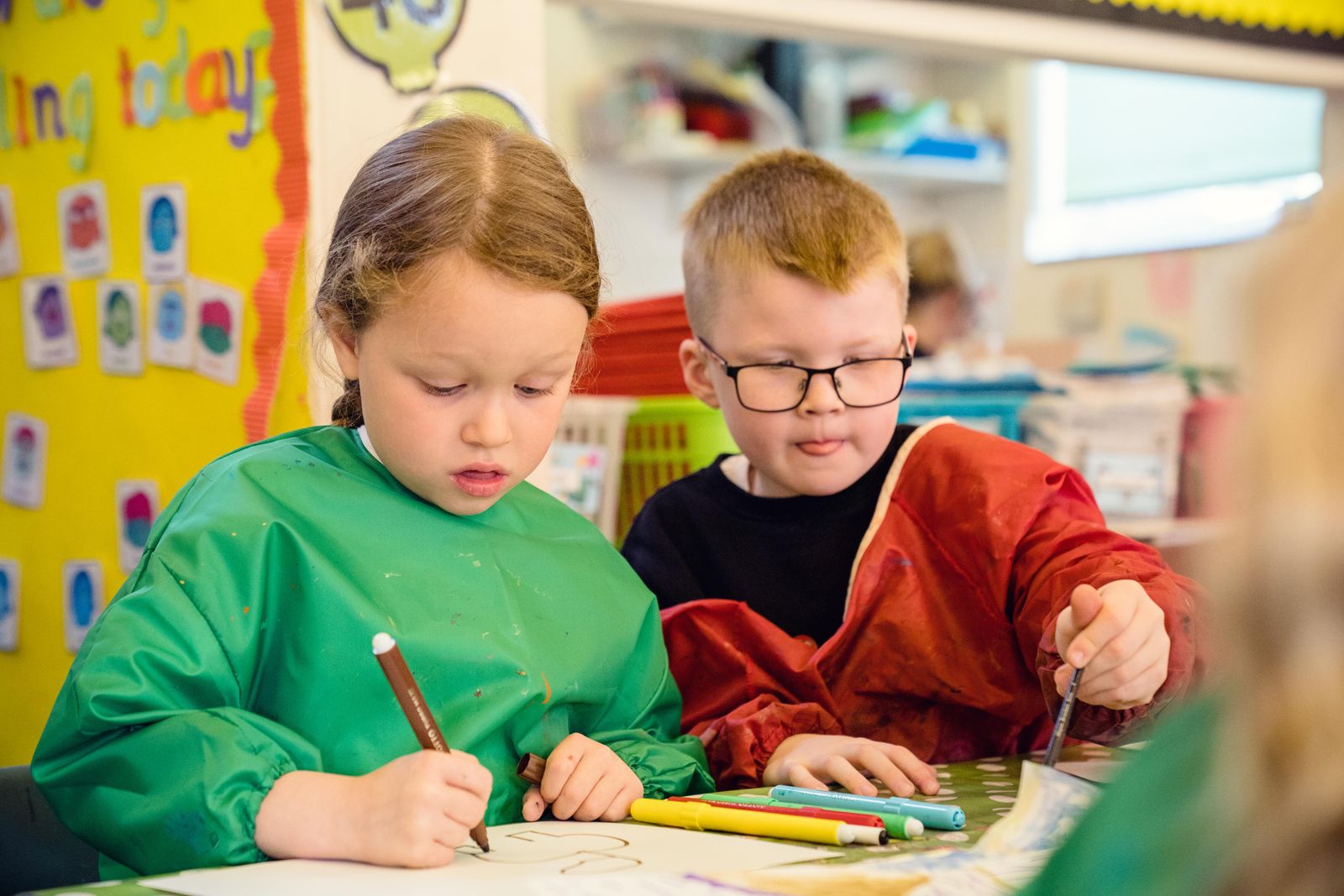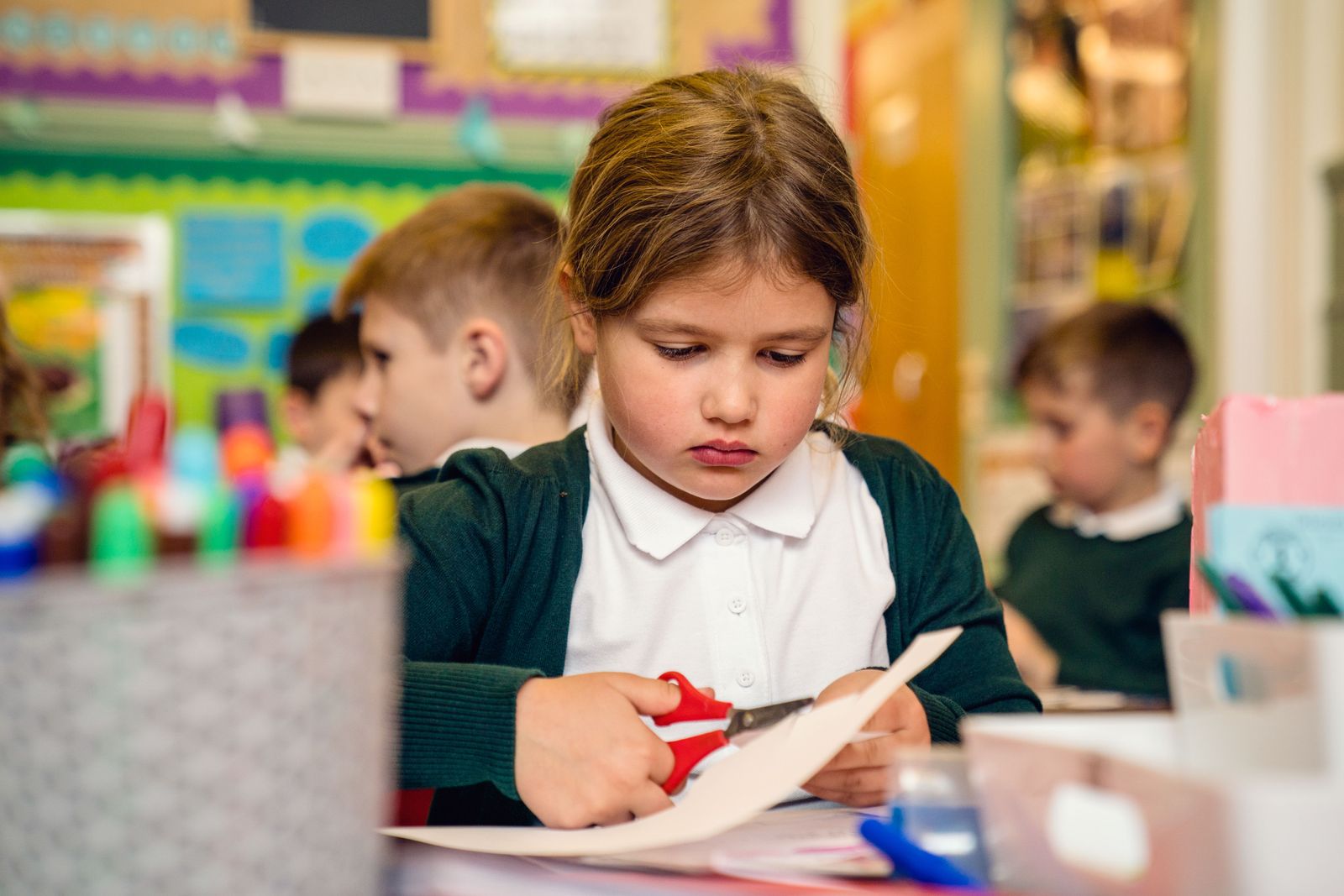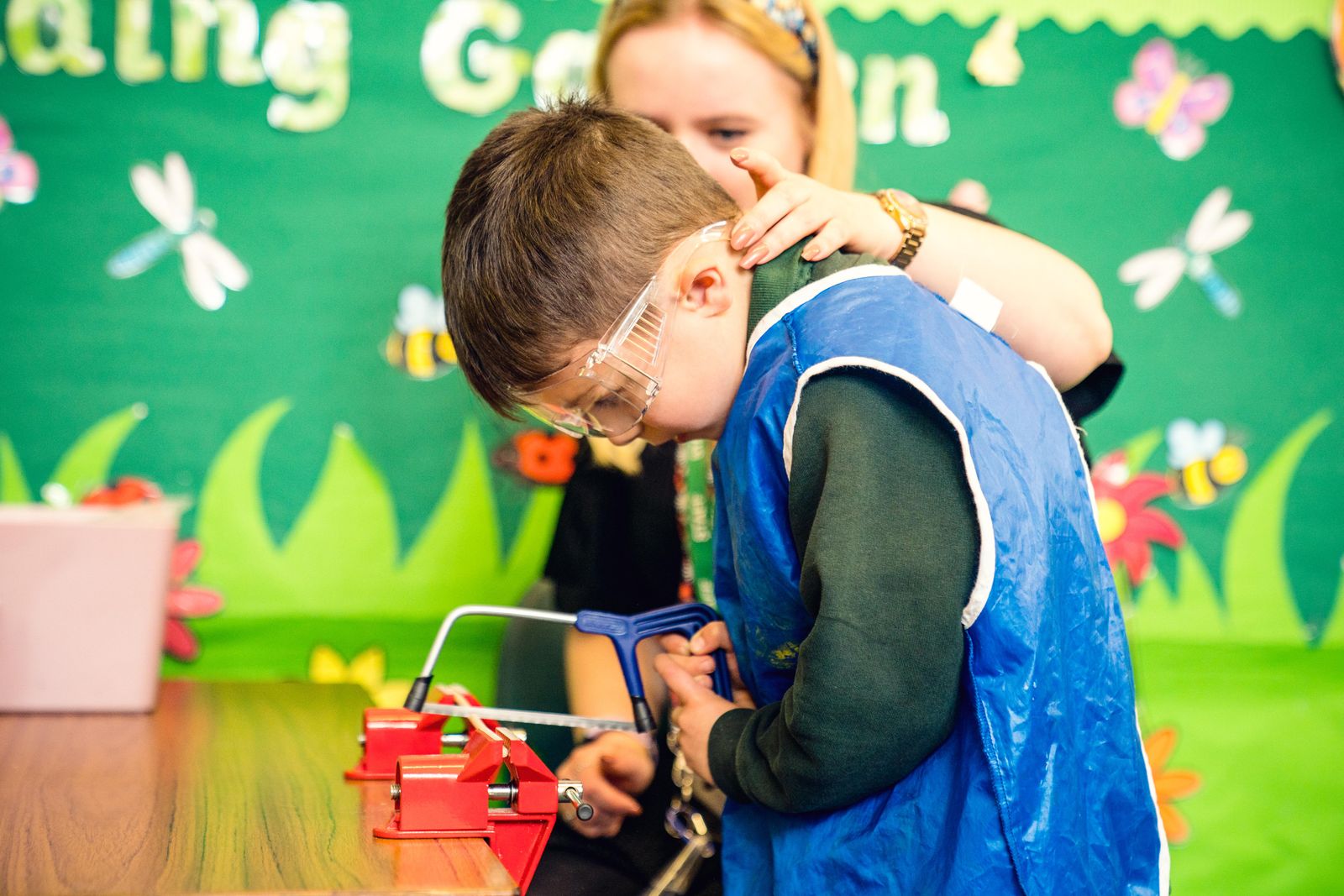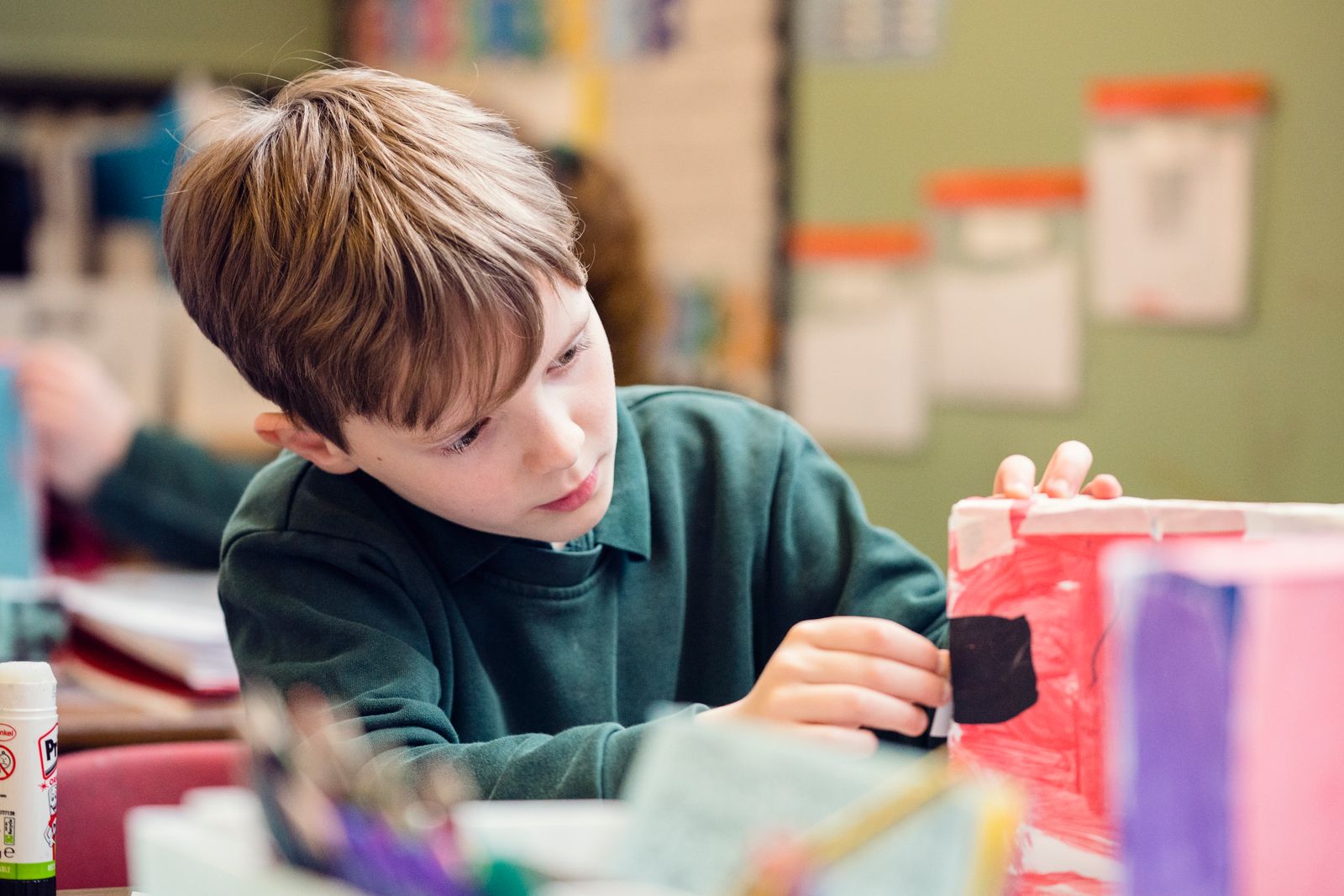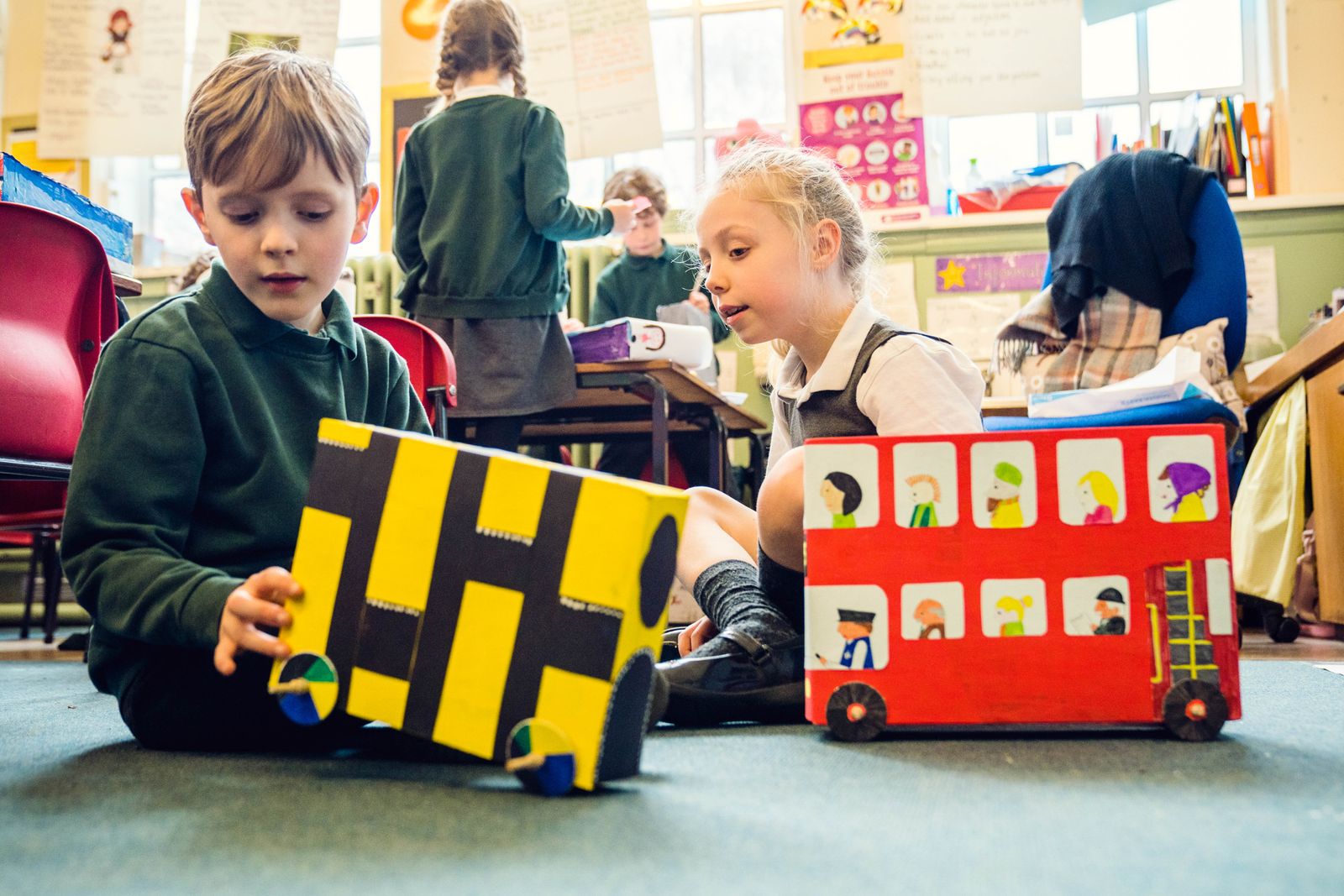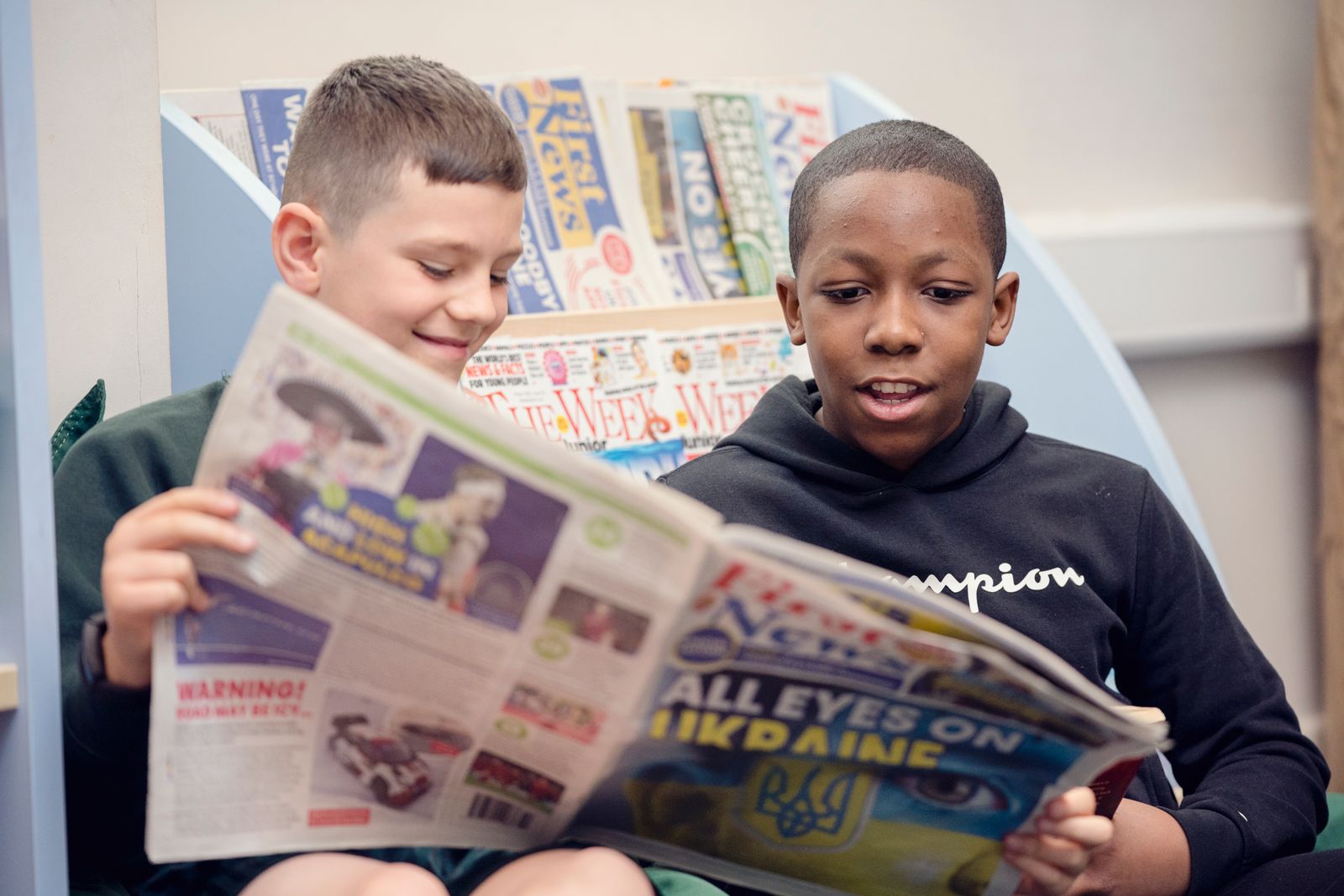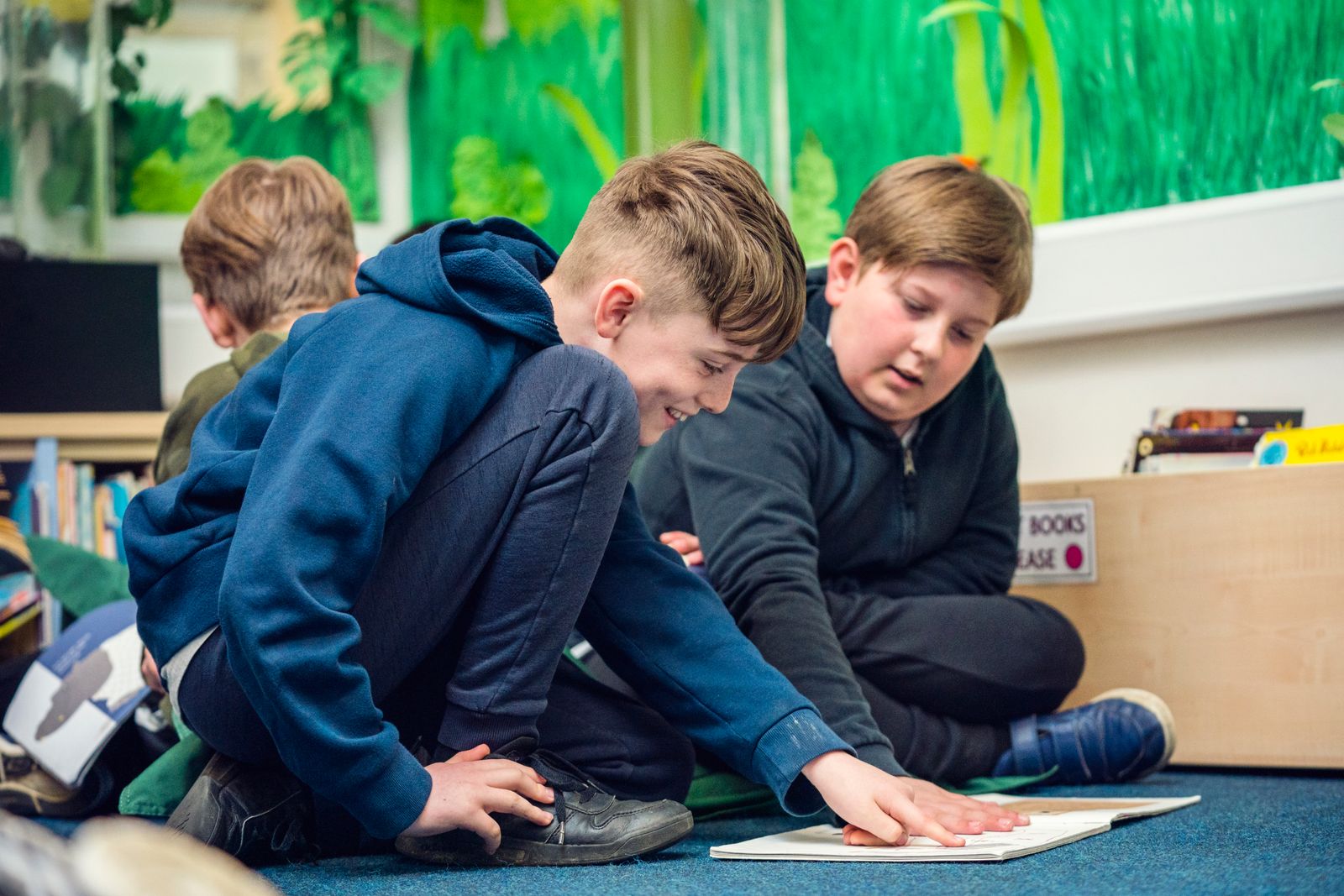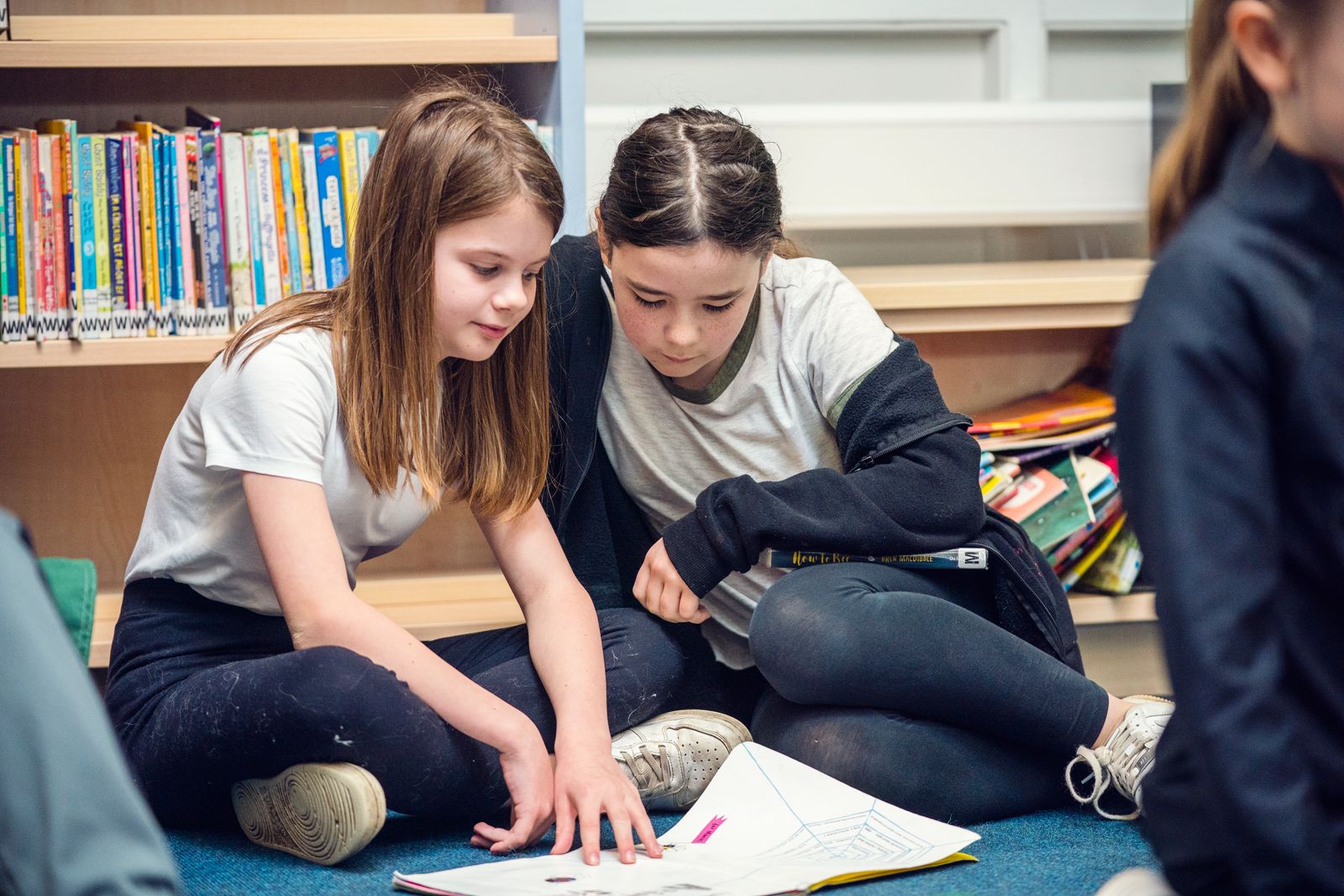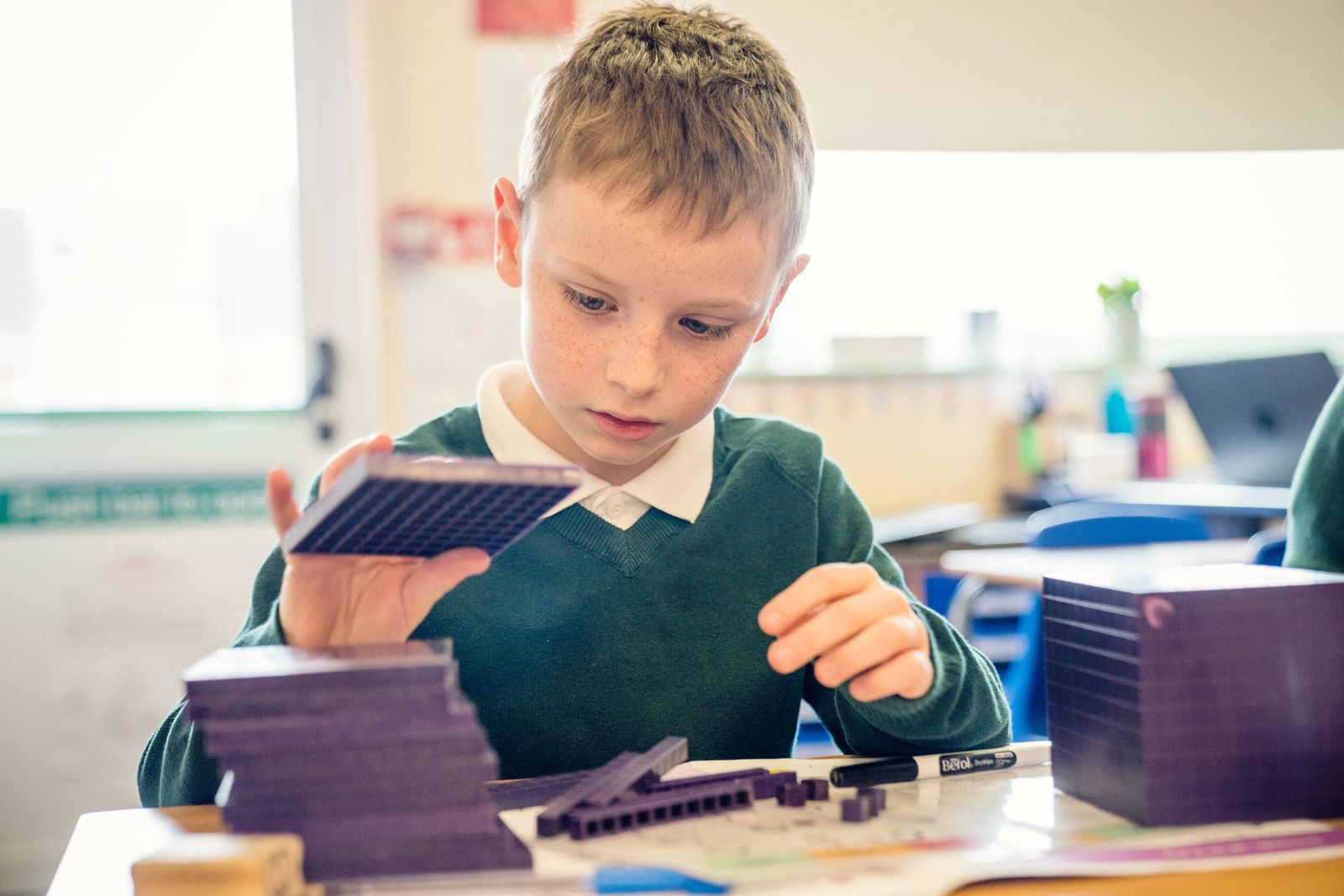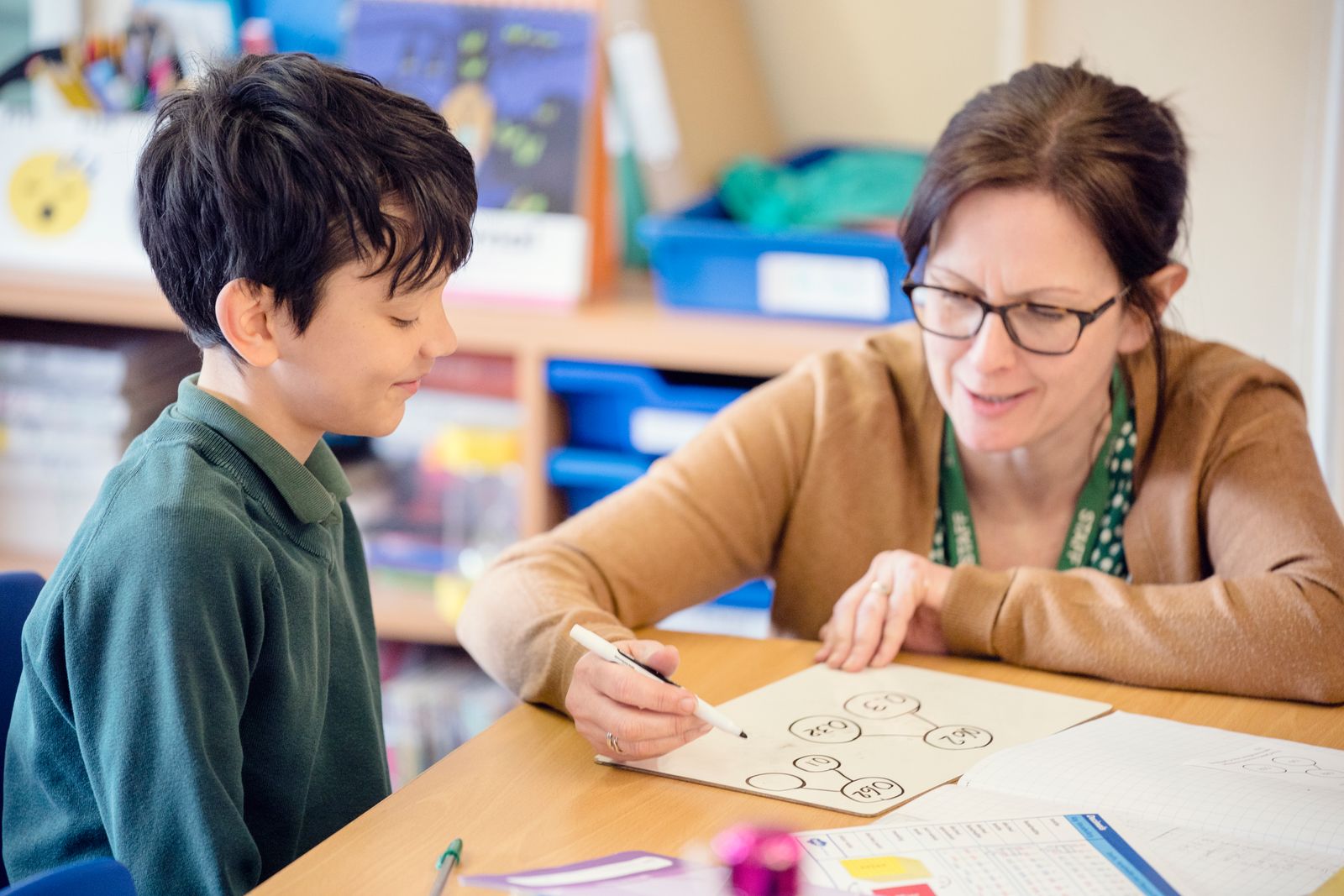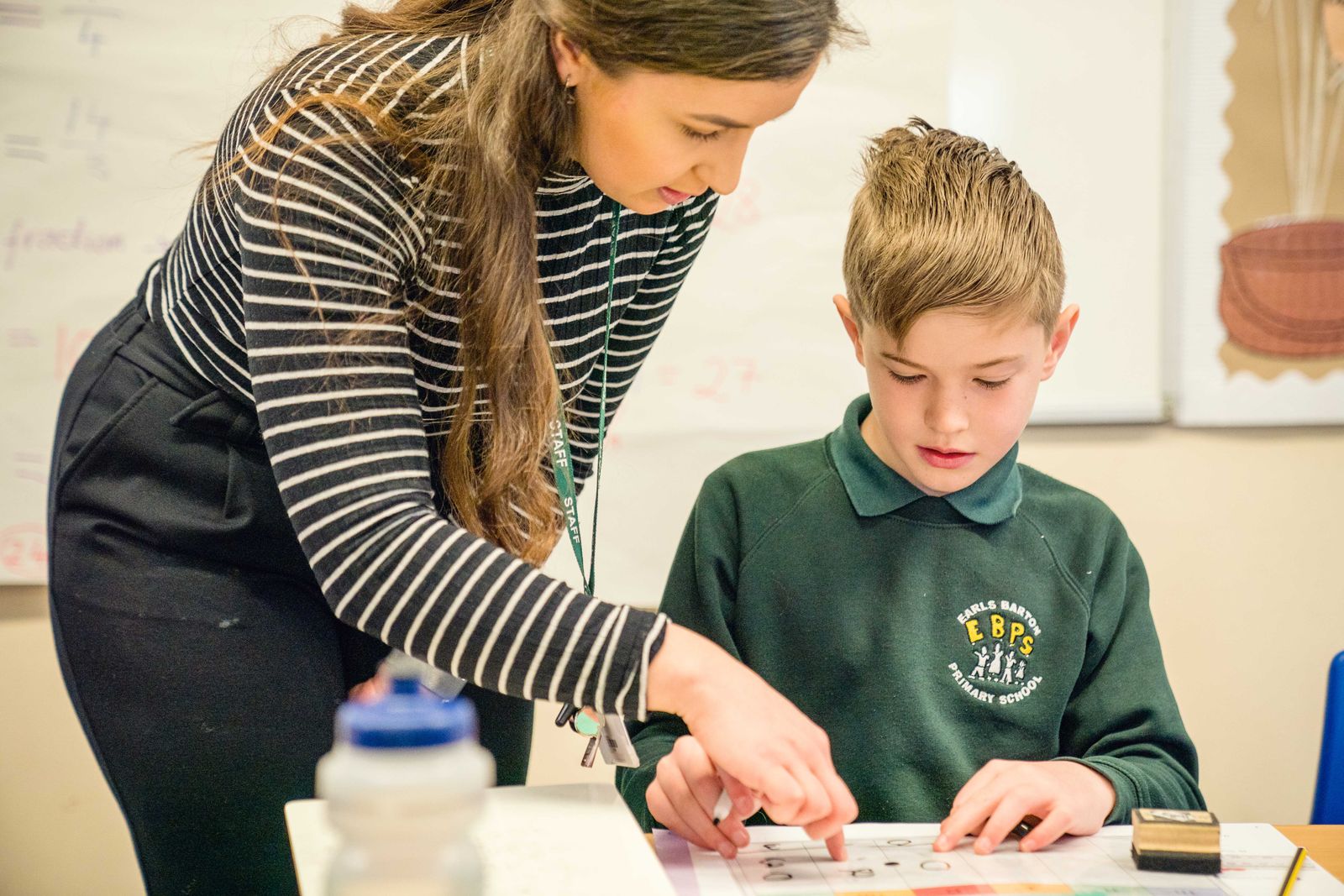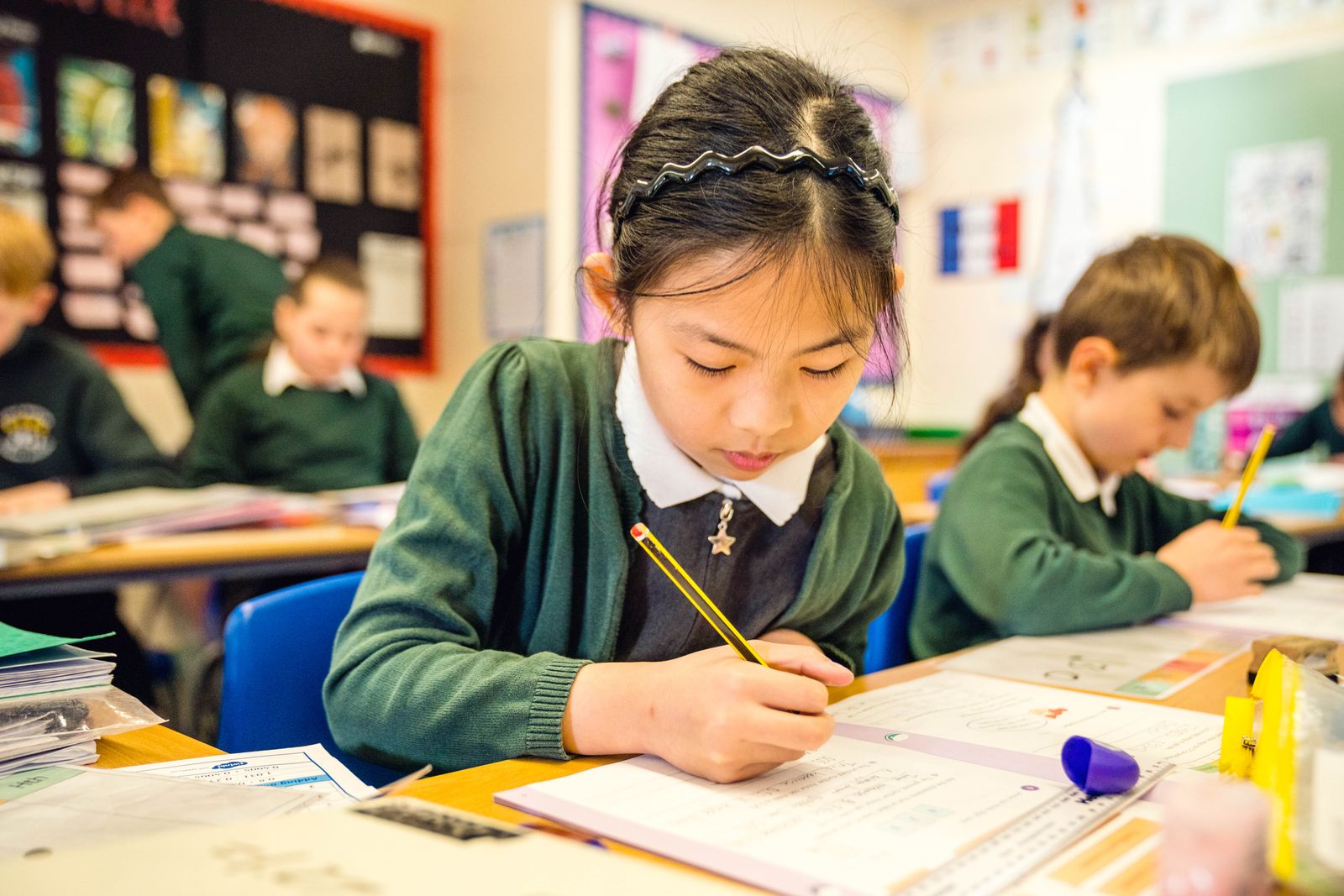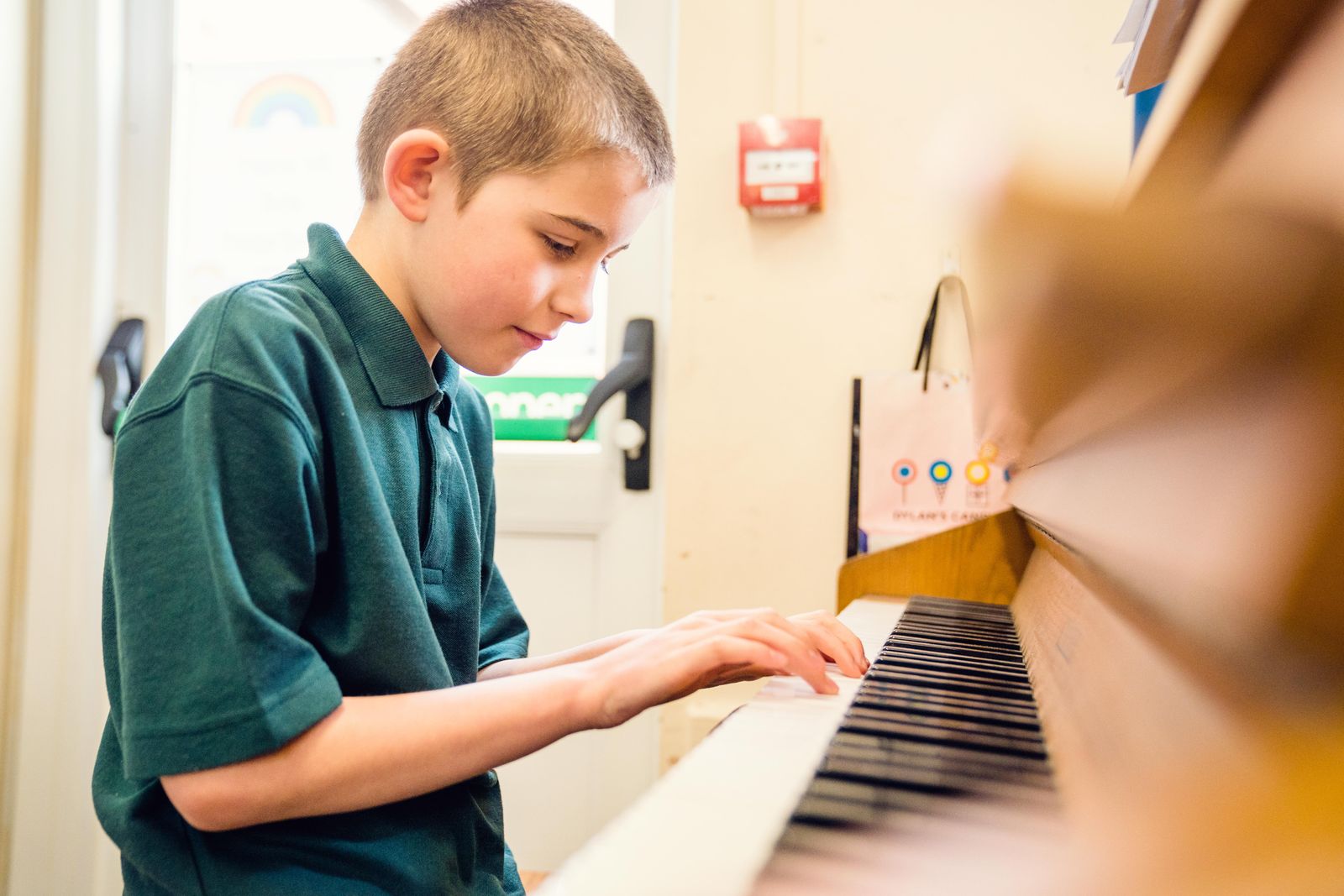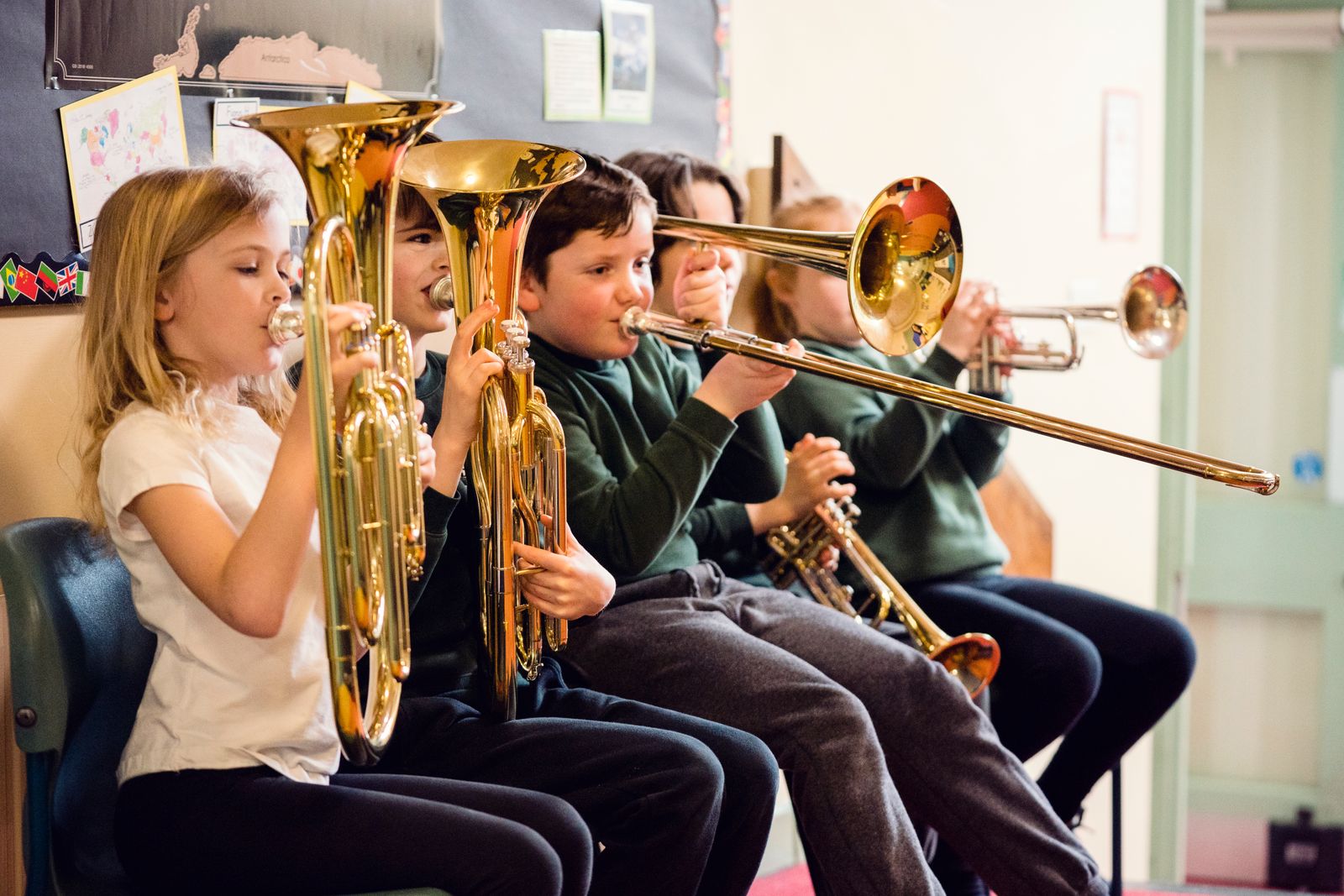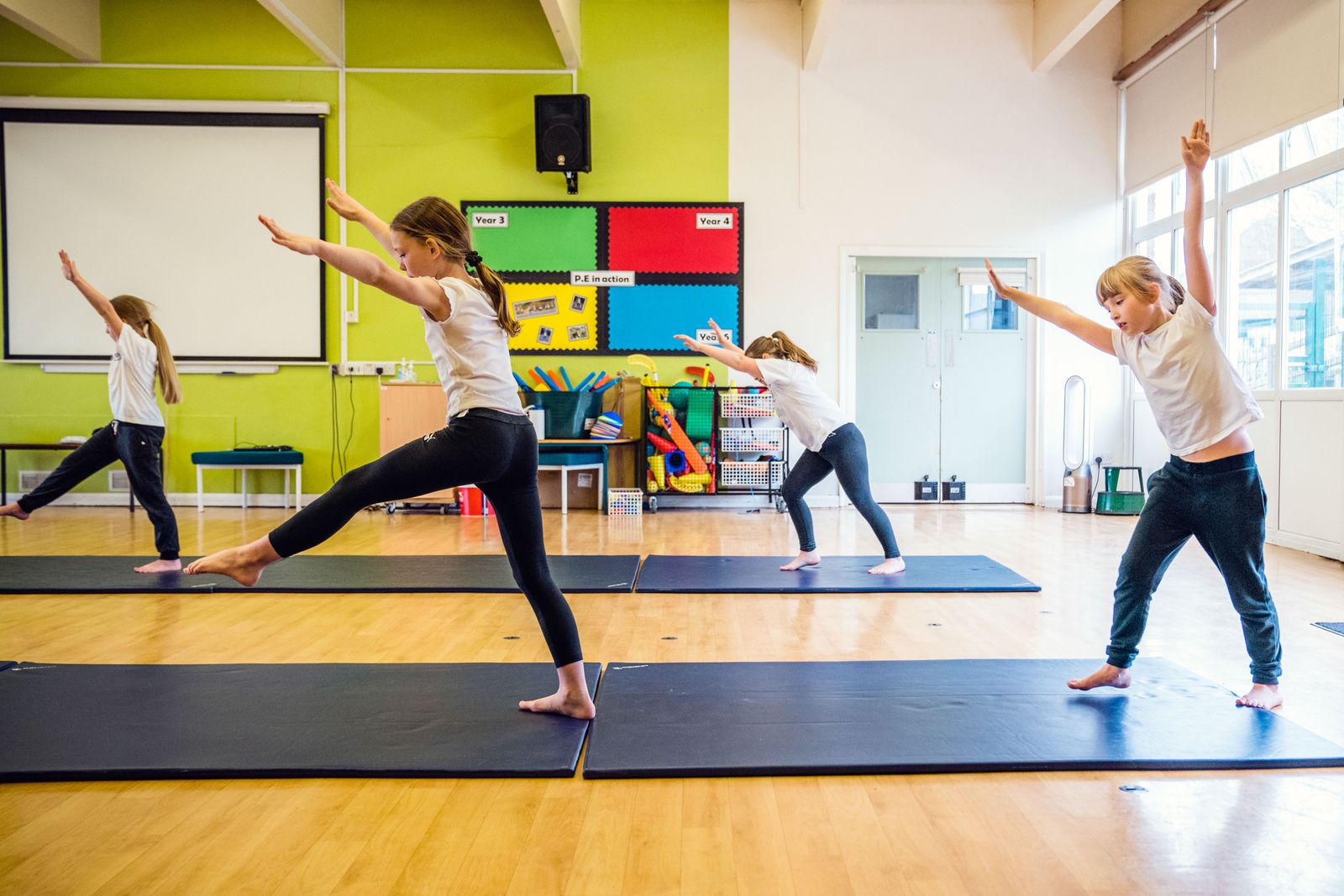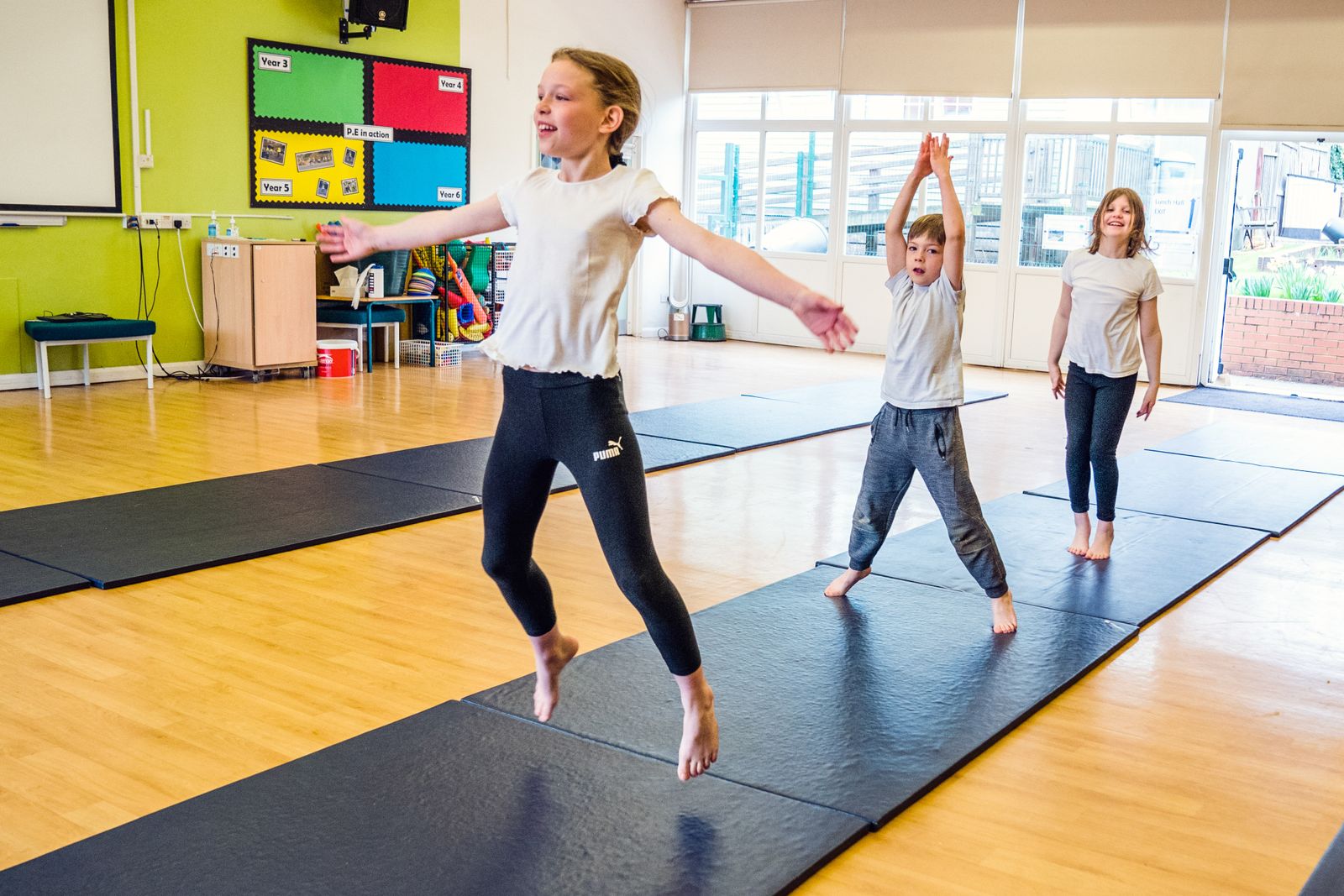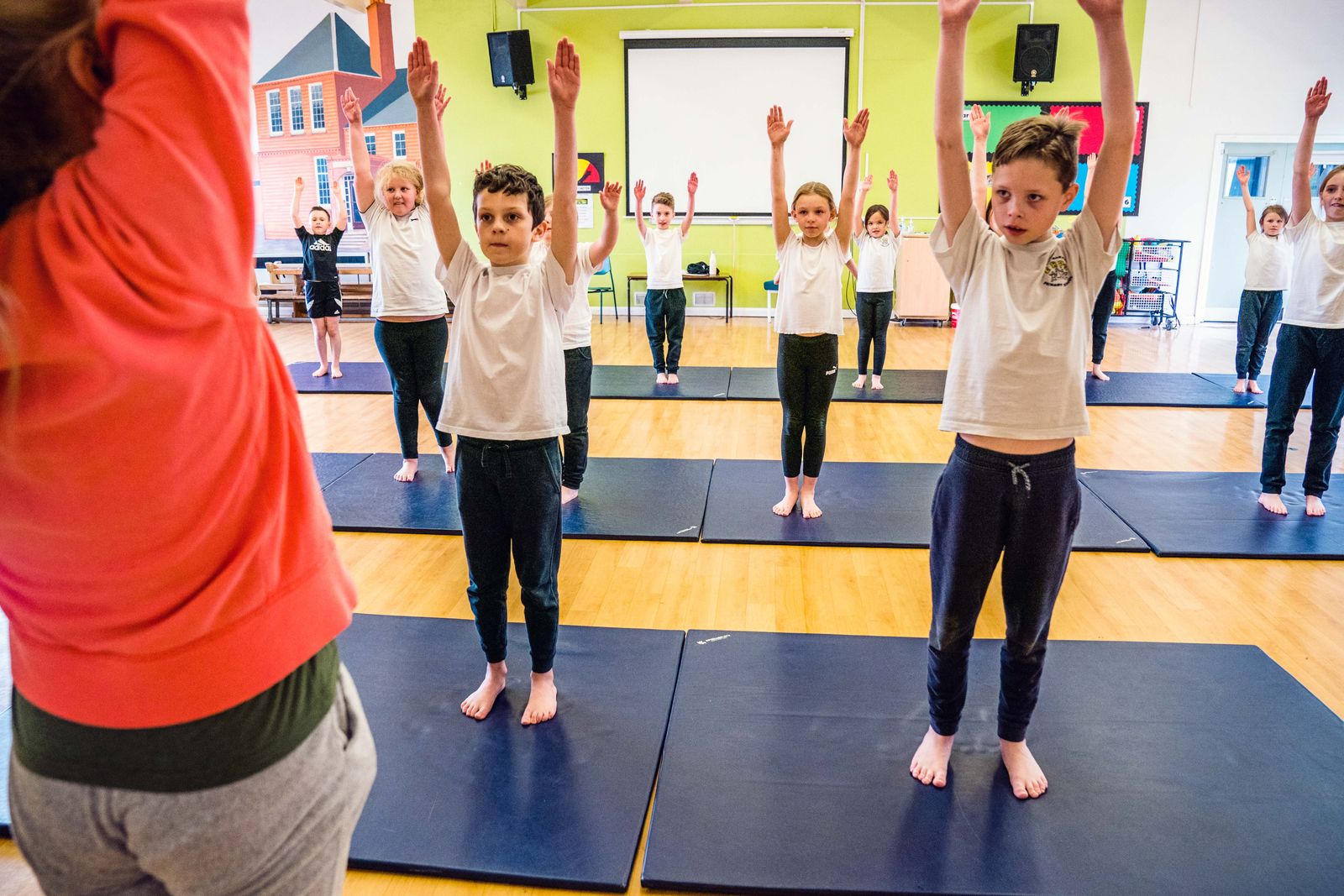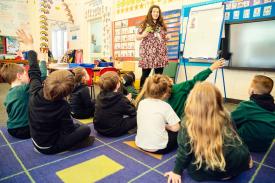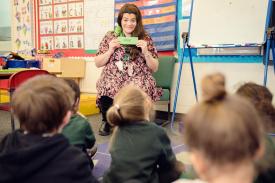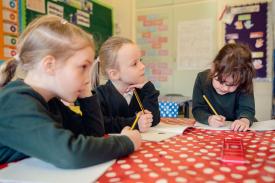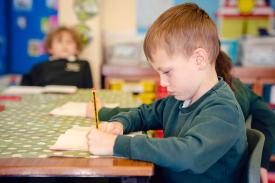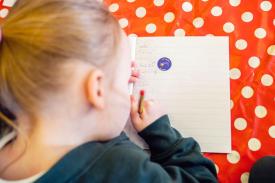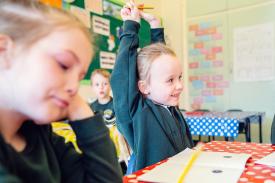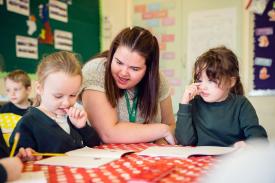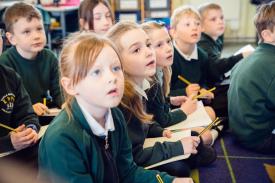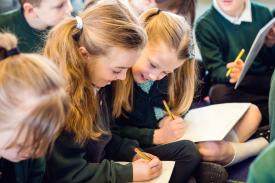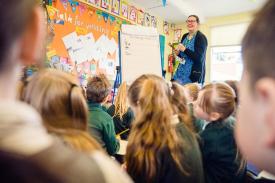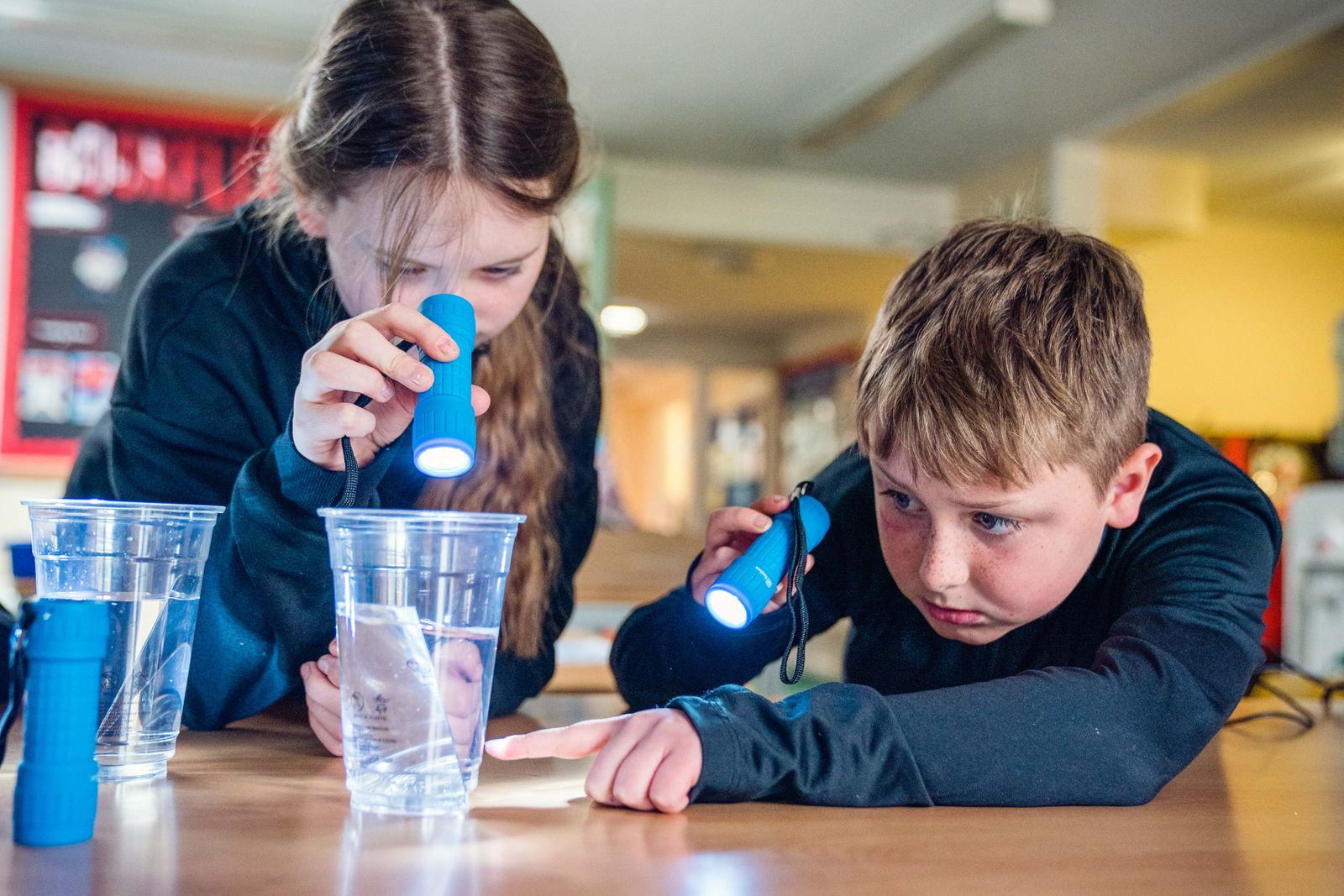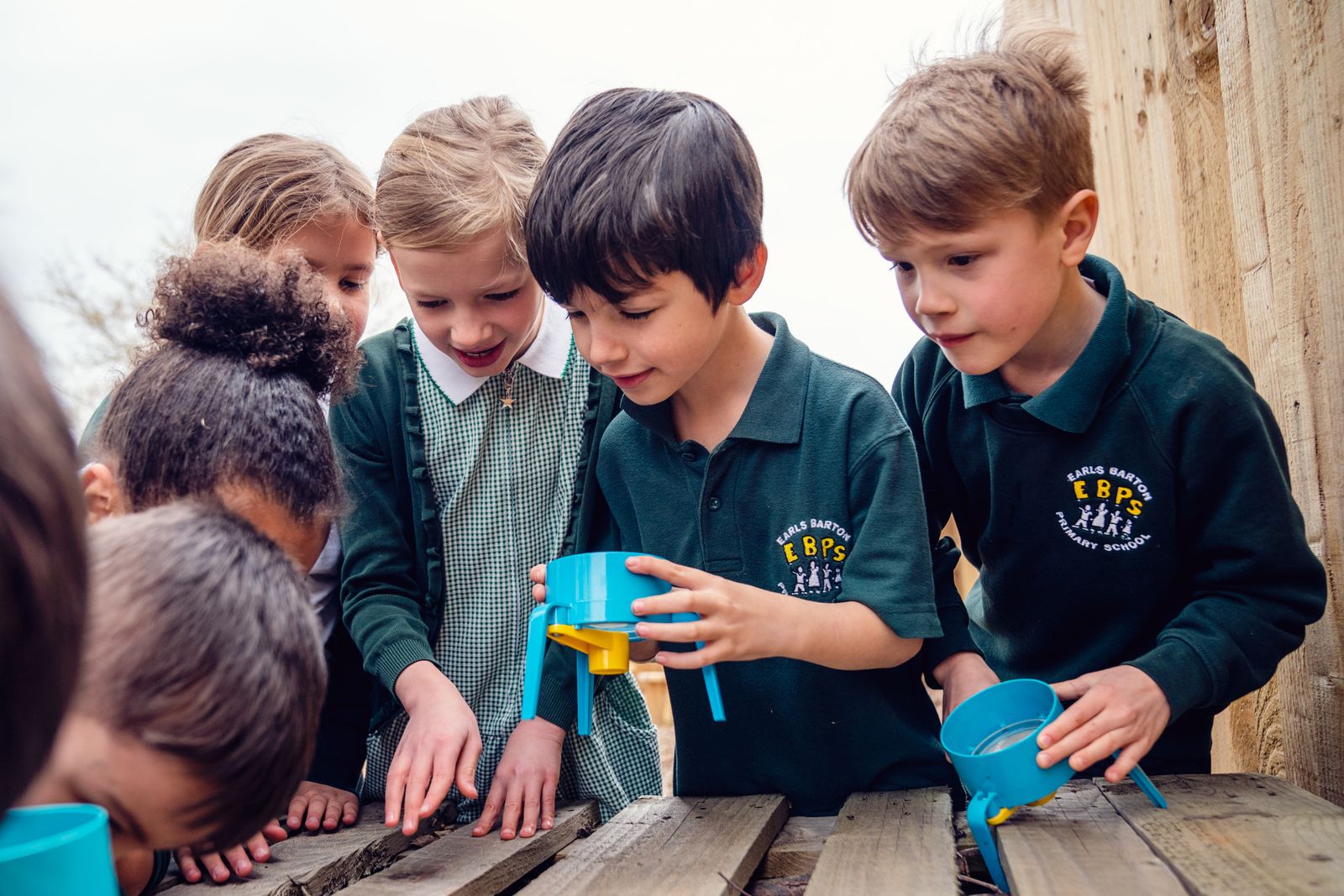We offer all of our children a broad and balanced curriculum which includes all statutory aspects of the National Curriculum for Y1 – Y6 and the revised EYFS curriculum for Reception.
Our children are taught phonics (using Read-Write Inc) daily in Reception and KS1 with catch-up phonics sessions in KS2 as needed. Reading and writing are taught as discrete subjects at least four times per week each. Maths is taught every day for a full maths lesson following the White Rose Maths scheme as well as for an additional ten minutes every afternoon; Mastering Numbers is used in Reception – Year Two and daily times tables or reasoning practice are included in Key Stage Two. Science has two lessons per week in Y1 – Y6 and is interwoven through “Understanding the World in Reception.
The foundation subjects are taught weekly to give children a broad and balanced curriculum (see Curriculum tab). History or Geography are taught in alternate terms. Art or DT are taught in alternate terms. Music, computing, PSHE, RE, French (KS2 only) are taught for 1 lesson per week and PE is taught for 2 lessons per week.
Please click on a curriculum subject header to view how we provide that topic, including intent, implementation and impact of that delivery.
Curriculum KEYS: Values, Horizons, Equity, World, Love

|
Subject |
Intent |
Implementation |
Impact |
|---|---|---|---|
|
Art |
At Earls Barton Primary School children will be able to confidently express their thoughts and feelings through the medium of art. They will be inspired by a diverse range of artists from throughout history and today. |
At EPBS, Art is taught as a discrete subject in three of the six terms across the year. The curriculum is carefully planned to ensure a progression of skills that are built on year on year. Pupils are given opportunities to explore a range of artwork before developing each key skill and creating their own masterpieces. They are encouraged to be reflective of their own artwork as well as others. Pupils are given opportunities to display their work in ‘pop-up galleries’ for parents and visitors. |
Engagement with art is assessed through book looks and pupil voice. When children leave EPBS, they will be masters of a range of art techniques and have an awareness of the diverse art across the world. They will be confident artists that can express their individuality through visual forms. |
|
Subject |
Subject leader |
Subject implementation / curriculum design |
How taught |
How assessed (what’s the impact?) |
|---|---|---|---|---|
|
Art |
Carla Murphy |
Art units follow the curriculum map that has been developed based on the children in EBPS and is implemented across the school from Early Years to Year 6.
Within Reception, art is part of the “Expressive Art and Design” area of learning. Art skills are taught through whole class teaching and modelling, as well as independent opportunities for art, design, music and drama throughout the continuous provision indoors and outdoors. |
Discrete lessons taught in three out of the six school terms in Y1 – Y6 There should be six lessons/at least six hours worth of teaching for each unit of work.
|
Art is currently assessed through book looks and pupil voice.
In Reception, “Expressive Art and Design” are tracked as per the school-designed “on-track” statements towards the Early Learning Goal at three points in the year. |
Curriculum KEYS: Values, Horizons, Equity, World, Love

|
Subject |
Intent |
Implementation |
Impact |
|---|---|---|---|
|
British Values |
There are five fundamental British Values which are at the core of many of the subjects we teach discretely. These values are: The Rule of law; Democracy; Mutual respect; Tolerance; Individual liberty. The development of these values, which are taught largely through curriculum subjects, help to ensure that all pupils are successful and become responsible members of the school and local community. |
At EBPS, British Values is not taught as a discrete subject, although there are events in school that focus on a particular value. For example in the Autumn term, democracy is the focus in the lead up to polling day when the School Council are elected. British Values are predominately taught through curriculum subjects such as PSHE, RE, PE, History and Geography. These subjects, along with others, provide children with opportunities to explore and sometimes challenge their own and others’ beliefs, attitudes, values, rights and responsibilities. |
The impact of British Values can be seen in the way children demonstrate them when they are speaking and in the way they behave and conduct themselves. When children leave EBPS, they will have gathered knowledge and acquired and built on the skills needed in order to live healthy, safe, ambitious, responsible lives in their community and today’s world. |
|
Subject |
Subject leader |
Subject implementation / curriculum design |
How taught |
How assessed (what’s the impact?) |
|---|---|---|---|---|
|
British Values |
Clare Lawton |
Values and British Values are taught all the time through many subjects and situations that may happen both in and out of the classroom. They are taught through class discussions, assemblies and through other curriculum subjects from EYFS through to Year 6. |
Not taught as a discrete lesson, but through subjects such as PSHE, History, Geography, PE and RE. Values are also taught in assemblies. |
Understanding of values, including British Values can be monitored through pupil voice. It can also be monitored by how children conduct themselves around school and in activities outside of school when children share achievements etc. Observations can also be made of reactions and contributions to discussions and scenarios both in the classroom and on the playground.
|
Curriculum KEYS: Values, Horizons, Equity, World, Love

|
Subject |
Intent |
Implementation |
Impact |
|---|---|---|---|
|
Computing |
In Computing, we use the iCompute curriculum to ensure that our pupils are offered a progressive curriculum, where skills are revisited, developed and extended year on year. Units are carefully scaffolded to develop technical programming skills, an understanding of computer systems and networks as well as the ability to present information or create media. Teacher’s subject knowledge and confidence is supported through the teaching resources and guides which run alongside each unit plan. Lessons are amended and adapted to tailor learning to pupil needs; ensuring children are supported to keep up with learning within all units. Whilst recognising the benefits that technology brings, children are taught about the risks that the technological world can present. They learn strategies to ensure safe and positive experiences whilst online at an age- appropriate level both through discrete Online Safety units and throughout the Computing curriculum. |
At EBPS, we implement the iCompute programme across the whole school; with a one hour discrete computing lesson being delivered once a week across Years 1-6. The iCompute programme is progressive across the whole school, building on prior learning and subject knowledge. All topics covered build on the 3 core strands of the computing curriculum: · Computer Science · Information Technology · Digital Literacy |
When children leave EBPS they will be equipped with the tools required to use technology safely and effectively in order to become life-long learners. In order to do this they will also be able to: Confidently code across a variety of platforms. Have knowledge of a range of information technologies. Show a good awareness of digital literacy to be able to access ICT safely. |
|
Subject |
Subject leader |
Subject implementation / curriculum design |
How taught |
How assessed (what’s the impact?) |
|---|---|---|---|---|
|
Computing |
Val Luca |
Computing is delivered to Years 1-6 through the iCompute scheme of learning. This features discrete units focusing on the 3 core strands of the Computing curriculum: computer science, information technology and digital literacy. |
1 lesson of one hour per week. |
Most units feature a final ‘project’ to enable children to show what they have learned. |

Curriculum KEYS: Values, Horizons, Equity, World, Love

|
Subject |
Intent |
Implementation |
Impact |
|---|---|---|---|
|
Design & Technology |
Design and Technology is a subject that encourages children to display their creativity and ingenuity as well as take risks and experiment with design ideas. Our curriculum has been developed to run alongside the school values which are supported by our curriculum keys to deepen their curiosity into how things are built whilst also providing them with life skills. Across the school, our Design and Technology units have been carefully constructed to enable to children to develop their skills evaluating, designing and making. The heart of every unit will be skill development – each unit aiming to impart a new ‘real world’ skill and understanding upon our pupils which they can transfer into the daily lives. |
At EBPS, Design and Technology is taught as a discrete subject in three of the six terms across the year. The key areas of learning are structures, mechanisms, textiles and food technology. Our curriculum is carefully designed to develop the practical skills of the children. Progression is mapped out across all year groups from Early Years to Year 6 to ensure progression in the skills that children are learning, whilst also building upon their prior knowledge. Each unit of work follows the same structure: evaluating existing products, developing new skills, designing, making and evaluating our final product. Each stage in the process builds upon each other, enabling the children to draw upon their deepening knowledge as the unit progresses. |
The impact of the learning in Design and Technology is measured through a comprehensive monitoring cycle which includes book looks, learning walks, pupil voice, and curriculum intent reviews. Findings from these monitoring activities will be utilised to review and refine the curriculum being offered to the children. When children leave EBPS, they should take with them a range of skills that they have learnt, refined and developed across our Design and Technology curriculum. They should have an understanding of how the skills they have learnt apply to different careers and situations in life. |
|
Subject |
Subject leader |
Subject implementation / curriculum design |
How taught |
How assessed (what’s the impact?) |
|---|---|---|---|---|
|
Design & Technology |
Val Luca |
Design and Technology units follow the curriculum map that has been developed based on the children in EBPS, implemented across the school from Early Years to Year 6. |
Discrete lessons taught in three out of the six school terms. There should be six lessons/at least six hours worth of teaching for each unit of work. In Early Years, Design and Technology activities and skills will be out in provision. Discrete units will be taught in small groups with a specific skill focus. |
Progression of skills map has been created, however, assessment in the subject needs to be developed. The skills in Reception are assessed within the Expressive Arts and Design curriculum towards the Early Learning Goal. |
Curriculum KEYS: Values, Horizons, Equity, World, Love

|
Subject |
Intent |
Implementation |
Impact |
|---|---|---|---|
|
Reading |
Our reading curriculum is driven by a desire to improve all pupil outcomes in reading and phonics to create life-long lovers of, and learners from, reading. The reading curriculum is designed to equip our children with the skills and knowledge to make sense of, and contribute to, the diverse world around them, developing global citizens. We will continue to raise profile of reading in the school and wider community to ensure it sits at the heart of learning. Accurate assessment of phonics and reading across the school ensures that pupils are challenged and supported according to their individual needs. |
Reading is timetabled daily with whole class reading lessons providing challenge and scaffolds to ensure every pupil meets their potential as a reader. Vocabulary explorations ensure an uplevelling of all children. Skills are developed through peer discussion, individual thinking, teacher modelling and independent application activities. Texts are pitched at a level to challenge, range in type and source to prepare children for their future at college, university or work where reading of articles can supersede novels. Children work in mixed ability pairings to further challenge and scaffold. Progressively challenging class reader texts are read aloud by an adult every day. The lowest 10% of readers in each year group are heard to read by an adult daily, the lowest 11-20%, at least 3 times weekly to close specific gaps and build confidence and fluency. Fluid phonics grouping ensures all pupils are supported and challenged appropriately A school wide reading environment provides children with the space and motivation to succeed as a reader. Parents and reading buddies provide additional reading experiences within school with the school and community library giving quiet reading and independent text choice opportunities. Children are inspired by adults, peers and visitors to the school during their reading journeys. Children can articulate what skills they are learning and how they are progressing as a reader. Accurate assessment enables teachers to support and challenge every child to reach their full potential. |
The impact of the reading curriculum is evidenced in many ways. Foremost, through the children themselves, listening to them read and answering questions about a text. The impact will be evident from fluent reader who can confidently discuss the text read. In addition, book looks and learning walks will provide evidence that children are engaged in their learning and excited about their reading. Children can articulate what skills they are learning and how they have progressed as a reader. They will be able to share a love of texts and discuss class readers, the characters and plots. Children will be able to comment on which authors they enjoy reading. Learning walks show lessons following the reading overview, children clear in the learning intention and work in books shows independent application of skills with high expectations clear. |
|
Subject |
Subject leader |
Subject implementation / curriculum design |
How taught |
How assessed (what’s the impact?) |
|---|---|---|---|---|
|
Reading |
Leanne Warren |
A Whole class reading structure focusing on core reading skills where every pupil is able succeed. Each lesson provides vocabulary and retrieval practice with an additional skill focus; inference, prediction, explanation, summarising and sequencing. Two lessons also have a fluency focus to support better comprehension. Pupils are provided with the opportunity for peer discussion, individual thinking time and a solo task where full written answers and required. To ensure success and challenge, children sit in mixed ability pairs, are given scaffolds in the form of sentence stems and modelling along with a challenge question to promote higher level thinking. An EDI text is included for a minimum of one session each term. Foundation subjects are also linked across each term (Science one week every term, the remaining weeks shared between all other foundation subjects). Varied text types are also organised across the term to ensure full coverage with two weeks of Non-fiction (which can be information texts, websites or standard non-fiction books), two weeks of fiction (split into picture books and novels) and two weeks of poetry (one for analysing texts and one for learning and reciting). Lowest 10% of readers in each year group heard daily Next lowest 11-20% in each year group heard 3x per week |
Minimum of 4 x whole class reading lessons weekly in KS1 and KS2 focused on key skills of fluency, retrieval, vocabulary, inference, predictions and explanation. Reception – Daily shared story time where vocabulary, inference and prediction questions are discussed |
KS1 - Phonics reading levels, fluency and comprehension skill level through questioning. Words read correct per minute KS2 (and those on AR from KS1) – Accelerated reader Scaled Scored in conjunction with fluency and comprehension skill level though questioning. Words read correct per minute Reception – assessed through Read-Write Inc phonics assessments and book banding. EYFS curriculum statements for reading reviewed at least three times per year in-line with school developed “on-track” statements towards the ELG. |
Curriculum KEYS: Values, Horizons, Equity, World, Love

|
Subject |
Intent |
Implementation | Impact |
|
|---|---|---|---|---|
|
Writing |
The writing curriculum is designed to provide a broad and balanced education that meets the needs of all children. It provides opportunities for children to develop as independent, confident and successful writers, with high aspirations, who know how to make a positive contribution to their community and the wider society. Our intent is for all pupils – irrespective of their needs, abilities or background – to learn to write fluently, developing their own writer’s voice. We aim to meet, and where possible exceed, the expectations laid out in the Early Learning Goals and National Curriculum, with pupils progressing appropriately across school. We recognise that spoken language underpins the development of Writing. The quality of language that pupils hear and speak is vital for developing their vocabulary and grammar and their understanding Writing. We believe that children need to develop a secure knowledge-base in Literacy, which follows a clear pathway of progression as they advance through the primary curriculum. We believe that a secure basis in literacy skills is crucial to a high quality education and will give our children the tools they need to participate fully as a member of society. We cultivate a love of Writing and communicating through vocabulary rich and high quality literature, using Ready Steady Write by Literacy Counts. By inspiring and developing an appreciation of our rich and varied literary heritage and providing meaningful and exciting provocations to write, we develop a habit of writing widely and often. We recognise the importance of nurturing a culture where children take pride in their Writing; can write clearly and accurately and adapt their language and style for a range of contexts. |
Organisation and Curriculum Coverage Ready Steady Write empowers teachers to provide high-quality teaching of writing through high-quality literature. These detailed units of work centre on engaging, vocabulary-rich texts, with a wealth of writing opportunities within and across the curriculum. They provide:
Our English curriculum is developed around a sequence of high-quality age-appropriate texts, using Literacy Count’s Ready Steady Write units of learning. We use each book to create opportunities to:
Building on this foundation, we teach literacy using a range of strategies which include:
Class teachers ensure that the Writing process is clearly evident on working walls, with modelled examples being available to all pupils as the sequence of lessons develops. Resources Each class will use their Ready Steady Write vehicle texts and supplementary texts which support the themes and genre being taught for that half term. The lesson plans and resources can be found online for teachers to use. Enhancements for the units can be seen in our indoor and outdoor areas in EYFS. Working Walls and Table Resources Each class is expected to develop an English working wall which adapts daily with teaching. Displays should model the writing process and scaffolds needed for children to apply to their own writing. Spellings, handwriting and supporting phonics materials should also be displayed within the classroom to aid children’s writing. Sentence accuracy checkers are available to all children, both in their books and in the environment. They will also be offered in incidental and final writes on self-assessment stickers to be used as prompts by the children in their editing and improvement. Staff will model the expectations throughout the curriculum. Planning The entire writing curriculum is mapped out on coverage and progression documents. Then, the Ready Steady Write units include all of the resources needed for each teacher to plan and deliver lessons. There are a range of scaffolds and supporting resources and teachers tweak and shape the units to meet the specific needs of their children. There are also assessment proformas which are completed following each unit and supports in identifying next steps for children. In addition, children have individual pencil targets closely linked to sentence accuracy work where possible, so they are all aware of how they can improve their own writing. Inclusion Children with English as an additional language: It is vital that children who have English as an additional language have English modelled accurately by all staff at school. Collaborative work with peers (where English is their first language) is essential and EAL children should be provided with consistent opportunities for this verbal interaction. All teachers include a range of strategies to support children with EAL which includes:
Teachers work with the SENDCO to best meet the needs of individuals within their classes. Children who are new to English are assessed and support is put in place to help them make rapid progress. Children with Special Educational Needs: Some children experience learning difficulties, which affect their progress in English. Class teachers inform the SENDCO if they are concerned that a child may have underlying learning difficulties. Some children then receive SEN support. This may include:
Confident and competent writers: Children are given opportunities to deepen their knowledge in writing and to effectively draw upon their reading when constructing texts. writing groups and differentiation. Lesson plans for Ready Steady Write include appropriate challenge and these are considered when delivering lessons. Wider reading opportunities will be provided and children encouraged to develop their own writerly voice. Drawing Club is used in our KS1 SEND/SEMH class. Each week focuses on a different text, focusing on expanding the children’s vocabulary. Each week of learning follows the same pattern, a character exploration, a setting exploration and then three days of ‘Adventure time’ where children are given an ‘unanswered’ question to write about. Oral, discussion skills are focused upon in each session, with the chosen grammatical, spelling and punctation skills chosen for each lesson. |
The innovative practice across the school provides a strong foundation and opportunities for children to collaborate and develop social skills both indoors and out. This curriculum design ensures that the needs of individual and small groups of children can be met within the environment of quality first teaching, supported by targeted, proven interventions where appropriate. In this way it can be seen to impact in a very positive way on children’s outcomes. Experiences will be planned both in and out of school to enhance the curriculum and provide opportunities for Writing for a purpose. Children have opportunities to share their learning with each other, their parents and carers and other learners through school-based and external exhibitions, performances, competitions and events involving other schools. Developing their independence and motivation as learners and their sense of responsibility as future citizens is at the heart of all our teaching and learning. As a result, we have a community of enthusiastic writers who enjoy showcasing their developing literacy knowledge and skills. They are confident to take risks in their writing, and love to discuss and share their ideas. Assessment Teachers draw upon observations and continuous assessment to ensure children are stretched and challenged and to identify those children who may need additional support. Formative assessment of Writing is completed through teachers’ daily feedback to inform future planning. Teachers use the children’s everyday writing and adapt models and input to meet their current needs. Teachers also complete a Reflecting on Unit outcomes document after each half termly unit, to identify next steps and the subsequent units are amended to include these focuses. Daily sentence accuracy work is carefully monitored to ensure children are constructing sentences both coherently and accurately. Regular staff meetings allow for whole school moderation of writing to deepen understanding of standards and ensure planning caters to all children’s needs, especially those most able writers. Subject leaders will analyse termly data and address areas for curriculum development. Children’s attainment, progress and barriers to learning will be discussed in termly Pupil Progress Meetings with senior leaders and clear actions to work on will be planned together, to support pupils and staff in closing gaps. |
|
Subject |
Subject leader |
Subject implementation / curriculum design |
How taught |
How assessed (what’s the impact?) |
|---|---|---|---|---|
|
Writing |
EYFS and KS1 - Emily Sparkes KS2 -Becky Scott |
Ready, Steady, Write is used from EYFS to Year 6. From Year 1 to 6, 2 RSW units are taught per term, including a fiction and non-fiction writing outcome. In EYFS, 1 unit is taught per term, built up to 2 units by the end of the year. Additional, whole-school writing units are also delivered. Drawing Club is used in our KS1 SEND/SEMH class. |
Writing lessons are taught daily. Every lesson in the Immerse through to Plan stage starts with a Sentence Accuracy activity to develop grammar, spelling and punctuation skills. Every unit includes incidental writes to develop the children’s skills producing different writing genres, including poetry. Each unit follows the same process: Drawing club follows the process: |
Assessments for learning are made throughout a unit. This is used to inform teacher/TA focus groups which vary daily, to work on specific skills and include SEND/EAL and GDS. At the end of each unit, children produce an extended piece of writing. This piece of writing is assessed against year group writing statements. This assessment is used to inform future teaching, focus groups and children’s pencil writing targets.
In Drawing Club, the class teacher chooses the appropriate grammatical, spelling and punctuation rules to focus upon in each session, using assessments for learning. |
Curriculum KEYS: Values, Horizons, Equity, World, Love

|
Subject |
Intent |
Implementation |
Impact |
|---|---|---|---|
|
Geography |
At EBPS, our Geography curriculum is designed to develop children’s curiosity and fascination about the world and its people, that will remain with them for the rest of their lives. It is supported by our whole school visions which are unlocked through our curriculum keys of Values, Horizons, Equity, World and Love as well as adhering to the National Curriculum for Geography. Children will investigate a range of places both in Britain and abroad – to help develop their knowledge and understanding of the Earth’s physical and human processes. We are committed to providing children with opportunities to investigate and make enquiries about their local area of Earls Barton and Northamptonshire so they can develop a real sense of who they are, their heritage and what makes our local area unique and special. Our aim is to equip our pupils with geographical enquiry skills, key lifelong knowledge and subject specific vocabulary. We aim to embed this knowledge through a challenging, knowledge rich curriculum delivered through high quality teaching and learning opportunities which culminates in children producing high quality outcomes. |
At EBPS, our knowledge rich geography curriculum is topic based upon what we consider the most important key facts. It is designed to help pupils remember what they have learned and builds upon previous learning. Key skills and key facts are revisited at different points within each year and across year groups. Progression is mapped out across year groups from Year 1 through to Year 6. Sequences of lessons are planned using progression mapping within and across year groups. Carefully considered key questions inspire active learning and challenge for all. Each topic is displayed in class and knowledge organiser are used in lessons, which outlines the knowledge (including vocabulary) all children must master and apply. Geography is displayed around school and priority is given to inspire children to the possibility of geographical careers and recommended books and websites. Whenever possible we invite people, who are experts in these fields, to visit school to motivate our pupils or take children out on educational visits. |
The impact of our Geography offer is measured through our comprehensive monitoring cycle, which includes book looks, learning walks, pupil voice, scrutiny and curriculum intent reviews. Upon review, the subject leader will agree and formulate an action plan for improvement. We monitor Geography skills against the Key knowledge for each topic. In assessing, we are looking for sustained mastery, greater depth, inspired learners and children who are fulfilling their potential. The intended impact of our Geography curriculum offer is outline below: 1. Children have an excellent knowledge of where places are and what they look like in both Britain and the wider world; 2. Children have a comprehensive understanding of the ways in which places are interdependent and interconnected; 3. Children have an extensive base of geographical knowledge and vocabulary 4. Children have the ability to reach clear conclusions and explain their findings; 5. Children have excellent fieldwork skills as well as other geographical techniques 6. Children have the ability to express well-balance opinions, rooted in very good knowledge and understanding about current issues in society and the environment; 7. Children have a genuine interest in the subject and real sense of curiosity about the world and the people who live here recognising the part they play within it. |
|
Subject |
Subject leader |
Subject implementation / curriculum design |
How taught |
How assessed (what’s the impact?) |
|---|---|---|---|---|
|
Geography |
Louise Dangerfield |
Scheme used – Oddizzi. Key stages one and 2 use Oddizzi within geography lessons to support and enhance teaching and learning. All teachers have access to the Geography Association website. In Reception, geography is taught as part of the EYFS curriculum area “Understanding the World”. Through whole class teaching, independent learning tasks and the continuous provision, children are taught about their local area and undertake field work in our Forest School as well as using maps and compasses, etc. in their role play. Geography is mapped to ensure progression across all key content and skills, also ensuring that statutory fieldwork opportunities are included consistently. |
Discrete lessons taught throughout 3/6 of the school terms. 1 lesson per week minimum
|
Oddizzi provides opportunities for assessment. This needs to be more of a focus for the coming year.
|
Curriculum KEYS: Values, Horizons, Equity, World, Love

|
Subject |
Intent |
Implementation |
Impact |
|---|---|---|---|
|
History |
The children of EBPS will be confident and conscientious historians with a well-developed sense of chronology, both of Britain and the wider world. They will understand how history is created and interpreted through exposure to a variety of experiences and lessons. |
History is taught as a discrete topic for 3/6 terms for at least one hour a week. Lessons are progressive within each year and develop children’s sense of: chronology throughout the world; significance through exploration of individuals and how they reflect school values; evidence including primary and secondary sources; interpretation through questioning, critical thinking and forming judgements; similarities, differences, change and continuity from one time period to the next; causes and consequences of events. Classroom lessons are enhanced with trips, visitors and experiences. A world view is considered across the curriculum. |
When children leave EBPS they will be able to demonstrate a critical understanding of history and form their own judgements and opinions. In order to do this they will also be able to: Distinguish between primary and secondary sources and comment on bias and reliability; compare and contrast time periods and accurately place them on a world timeline; use accurate historical vocabulary; draw links between an event, its cause and consequences following it; and consider two sides to the same coin. |
|
Subject |
Subject leader |
Subject implementation / curriculum design |
How taught |
How assessed (what’s the impact?) |
|---|---|---|---|---|
|
History |
Grace Bartholomew |
History is taught as a discrete topic for 3/6 terms for at least one hour a week. Lessons are progressive within each year and develop children’s sense of: chronology throughout the world; significance through exploration of individuals and how they reflect school values; evidence including primary and secondary sources; interpretation through questioning, critical thinking and forming judgements; similarities, differences, change and continuity from one time period to the next; causes and consequences of events. These skills are taught through an exploration of each national curriculum objective with some non-statutory examples being used for guidance and other units taking a more diverse/decolonised approach and consideration of local history and historical figures. Classroom lessons are enhanced with trips, visitors and experiences. A world view is considered across the curriculum through the inclusion of non-Eurocentric civilisations in years 3, 4, and 6 and local history studies in years 1 and 4. In Reception, history is taught as part of the EYFS curriculum area “Understanding the World”. Through whole class teaching, independent learning tasks and the continuous provision, children are taught a sense of the past and chronology as well as using sources of evidence to learn about the past. They Historical Association and Key Stage History are recommended resources for teachers to use, however we do not follow a scheme.
|
Discrete lessons taught throughout 3/6 of the school terms 1 lesson per week minimum during these terms. Taught by both class teachers and HLTAs
|
Assessments are currently based around teacher judgement and should focus on the 6 points of progression for each year group. Children in Y2 – Y6 are given the opportunity at the end of each unit of work to demonstrate their knowledge and understanding through a double page spread. |
Curriculum KEYS: Values, Horizons, Equity, World, Love

|
Subject |
Intent |
Implementation |
Impact |
|---|---|---|---|
|
Maths |
At Earls Barton Primary School we want pupils to become fluent in the fundamentals of mathematics and to be able to reason and solve problems. They will visualise using a concrete, pictorial and then abstract approach and make connections between different representations. They will describe using correct mathematical language and ask questions and discuss the concepts they are learning. They will foster a love for learning maths and make links with everyday applications |
Maths is timetabled daily, using White Rose’s small steps. Teachers will supliment these lessons by assessing their children;s knowledge during lessons and add and remove content as approriate. This is likely to include additional recap or extension, butcould also developing quick recall of number facts and arithmetic skills. We use Numbots and Times Table Rock Stars to support the improvement of quick recall. Prior knowledge is revisited in Flashback Maths sessions which usually begin a maths lesson Currently, we also have an additional daily 10min maths slot to deliver Mastering Number in KS1, Timestables in year 3 and 4, and problem solving in year 5 and 6. |
By the time a child leaves us in Year 6, they should have achieved their potential and have a solid base from which to springboard the next phase of their maths education. Children should have an awareness of the essential maths needed for their own future opportunities /ambitions and to survive using real-life maths in the world of work and their chosen career. |
|
Subject |
Subject leader |
Subject implementation / curriculum design |
How taught |
How assessed (what’s the impact?) |
|---|---|---|---|---|
|
Maths |
Jamie Stockham |
Maths follows the White Rose small steps and Scheme of Learning. Where necessary staff consult the Ready to Progress criteria to focus more time on specific areas where gaps have been identified or use this material for interventions as appropriate. Y2 children have a slightly different order so that children have experienced all areas of the National Curriculum before Statutory Assessments are made. |
EYFS – daily maths carpet sessions and teacher led and independent activities KS1 15min flashback maths 30min maths lesson daily KS2 4x 15min flashback maths and 45min maths lesson 1x times table or arithmetic lesson |
Maths is assessed primarily during and at the end of each lesson. End of Unit and end of term assessments produced by White Rose are also used to make more formal judgements. Y2 and Y6 children complete SATs. Y4 children complete the Multiplication Tables Check. Reception children work towards the school designed “on-track” statements for each term towards the ELG in mathematics |
Curriculum KEYS: Values, Horizons, Equity, World, Love

|
Subject |
Intent |
Implementation |
Impact |
|---|---|---|---|
|
French |
At EBPS, we ensure that every child in KS2 has the opportunity to learn French. We believe that early language learning fosters an appreciation of other cultures and enthusiasm for learning other foreign languages later in life. We aim to prepare the children for the KS3 language curriculum to enable them to transfer successfully. In Lower Key Stage 2 the focus is initially on oral communication whereas in Upper Key Stage 2 children should be able to express thoughts and ideas in both speech and writing. Studying MFL makes a valuable contribution to other curriculum areas, developing Speaking and Listening skills, understanding of grammar, rhyme and rhythm, geography, music/singing, group work and presentation skills. In KS1 we celebrate the language and cultures of other countries including those represented within our school community |
La Jolie Ronde scheme of work is used to support the teaching and learning of French, providing clear progression for the development of speaking and listening and acquiring vocabulary. Linguascope and additional resources are used to broaden topic vocabulary. This can be accessed online independently by pupils. A variety of techniques are employed to engage the children with French: - Chorused responses, Question and Answer, Games/Quizzes – all used to develop vocabulary through repetition, reading, writing, speaking and listening skills. - Role-play/drama/conversation – to build confidence speaking and often relating to situations the children may find themselves in the future. - Action songs and rhymes – to develop phonetic skills, memory skills and to further vocabulary. - Stories and videos – as opportunities to listen to native speakers. - Writing opportunities – to develop sentence building skills. UKS2 children will have the opportunity to exchange letters with a class in France. - Linguascope online activities – to broaden topic vocabulary and allow independent practice to develop skills We build children’s confidence through praise for any contribution they make in French, however tentative. Children are encouraged to respond to and appreciate a range of songs, stories and rhymes and express opinions. They are challenged to respond in sentences using accurate pronunciation and grammar. Assessment is informal and continuous and the children self-assess progress at the end of each term. In KS1 we promote simple greetings in other languages and celebrate European Languages and International Mother Language Day as a school. |
All pupils will grow in awareness of other cultures and languages to become successful members of our diverse community. The impact of high quality teaching of French we will be seen in the following ways: -Children will be able to communicate with each other in French. -Children will become aware that a language has a structure, and that the structure differs from one language to another. -Children will progress in French through development of the key skills of speaking, listening, reading and writing. -Children will enrich their language learning by developing an understanding of cultures of French speaking countries. -Children will transfer to KS3 successfully and will be prepared to continue and develop their language skills. |
|
Subject |
Subject leader |
Subject implementation / curriculum design |
How taught |
How assessed (what’s the impact?) |
|---|---|---|---|---|
|
French |
Jo Bromilow |
KS2 French lessons based on La Jolie Ronde Scheme and Linguascope activities. |
1 lesson of 45 minutes per week. |
Progression monitored through work in books on each topic and conversation practice. Recordings are made of role plays through the year. |
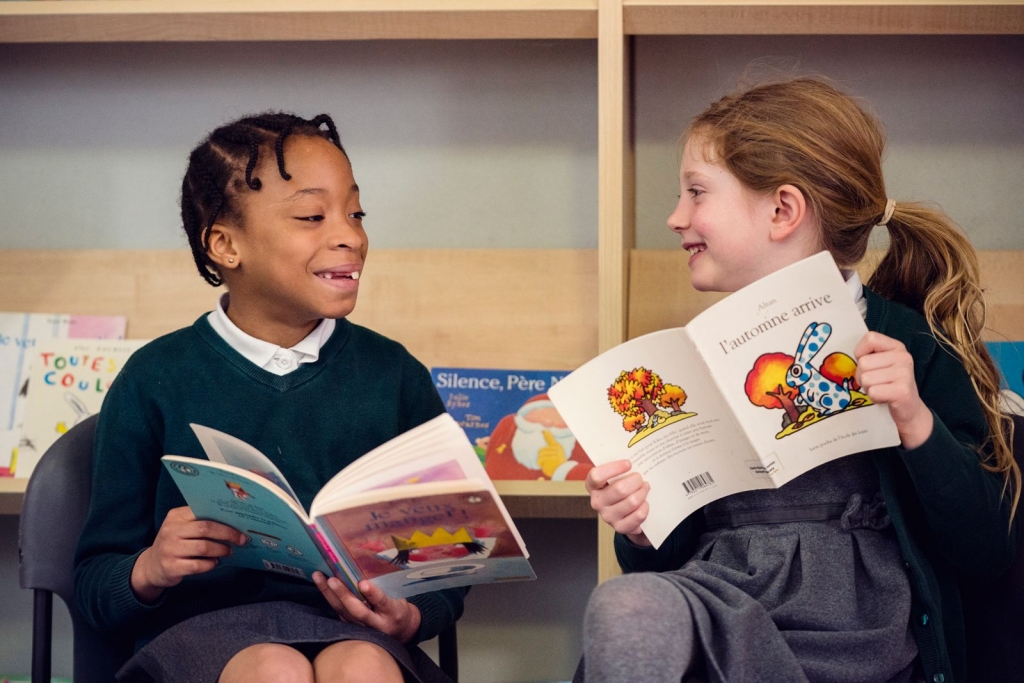
Curriculum KEYS: Values, Horizons, Equity, World, Love

|
Subject |
Intent |
Implementation |
Impact |
|---|---|---|---|
|
Music |
Music is a powerful subject which has a huge impact on mental health and well being. It should be an enjoyable experience for all those who participate in it. Children should participate in a range of experiences including performance ( both singing and playing), composition and developing an understanding of different genres of music from different time periods. |
Music is taught as a discrete subject on a weekly basis in all year groups from EYFS through to year 6. The Charanga music scheme is used as a basis for music work accompanied by a discrete composition and music appreciation session each half term. Weekly singing assemblies are held in both EYFS/KS1 and KS2 separately. NMPAT provide peripatetic lessons on a range of instruments. Music is important to the life of the school and this is shown through extra-curricular activities which include Junior and Senior choir and recorder clubs catering for different standards of playing. There are also performances involving all year groups at different times of the school year and participating in some community music events. |
The impact of music teaching in this school will be seen by the raised profile of music as a subject throughout the school. Whole-school and parental engagement will be improved through performances, extracurricular activities and opportunities suggested in lessons/overviews for wider learning. Assessment will be developed so that G&T children can be identified early and encouraged to participate in extracurricular music activities / learn instruments. Participation in music develops wellbeing, promotes listening and develops concentration which will, in turn help work in other areas of the curriculum. The ultimate aim is to ensure that music is participated in with enthusiasm by teachers and pupils across school, encouraging them to want to continue building on this wealth of musical ability, now and in the future. |
|
Subject |
Subject leader (and date since) |
Subject implementation / curriculum design |
How taught |
How assessed (what’s the impact?) |
|---|---|---|---|---|
|
Music |
Sarah Levell |
Scheme used – Charanga music. This is used as a base for 4/6 sessions for terms 2,3,4 and 5. In terms 1 and 6 a unit written by the subject lead on general musicianship to link with the Model Music Curriculum is used. Composition session x 1 and Music Appreciation session x 1 written by subject lead used each half term. |
Music taught as whole class in each year group from EYFs to Year 6 . It is taught as a discreet subject for one lesson a week of 45minutes – 1 hour |
Assessment grid developed with Can I statements on for each year group. For the year 2021-2022, this will be started in years 1 ,3 and 5 |
Curriculum KEYS: Values, Horizons, Equity, World, Love

|
Subject |
Intent |
Implementation |
Impact |
|---|---|---|---|
|
PE |
Earls Barton Primary School believes that Physical Education (PE), experienced in a safe and supportive environment, is essential to ensure children attain optimum physical and emotional wellbeing. Our lessons will deliver high-quality teaching and learning opportunities that enable all children to succeed in physical education and in developing life skills, such as swimming and road safety through Bikeability. Through our PE lessons we teach children how to cooperate and collaborate with others as part of an effective team, understand fairness and equity of play to embed life-long values. Our curriculum aims to improve the wellbeing and fitness of all children at Earls Barton, not only through the sporting skills taught, but through the underpinning values and disciplines PE promotes. |
PE at Earls Barton Primary School provides challenging and enjoyable learning through a range of sporting activities. Our indoor PE follows the Real PE scheme of work and in outdoor PE children are given the opportunity to take part in activities such as: invasion games, net & wall games, strike and field games and outdoor & adventurous activities. The long- term plan sets out the PE units which are to be taught throughout the year and ensures that the requirements of the National Curriculum are fully met. Pupils participate in two high quality PE lessons each week, covering two sporting disciplines every half term. In addition, children are encouraged to participate in the varied range of extra-curricular activities on offer, which includes 5 morning clubs and 3 after school clubs. Children are invited to attend competitive sporting events within the local area. This is an inclusive approach which endeavours to encourage not only physical development but also mental well-being. These events also develop teamwork and leadership skills. Each year a small group of Year 6 children are invited to apply to become the school’s Sports Crew. They develop into sporting role models for the younger children, running lunchtime games for our KS1 children 4 times a week, our annual Sports day and any other sporting activities. The school holds a Healthy week every year, where the children are encouraged to take part in activities, they wouldn’t normally have the opportunity to. Such as: Quidditch, freestyle football and lawn bowls. Children in Year 4 swim once a week for 10 weeks. We repeat the 10 weeks course for children in Year 5 who are still unable to swim 25m. |
At Earls Barton Primary School, we help motivate children to participate in a variety of sports through quality teaching that is engaging and fun. In our lessons, we provide the children with the key learning steps of leading a healthy lifestyle, where they learn to take responsibility for their own health and fitness and to enjoy the success of competitive sports. We equip our children with the necessary skills and a love for sport, which we hope will continue throughout their lives. |
|
Subject |
Subject leader |
Subject implementation / curriculum design |
How taught |
How assessed (what’s the impact?) |
|---|---|---|---|---|
|
PE |
KS2 - Carrie Rees EY & KS1 - Chloe Sturman |
Our indoor PE follows the Real PE scheme of work from EYFS to Year 6 and in outdoor PE children are given the opportunity to take part in activities such as: invasion games, net & wall games, strike and field games and outdoor & adventurous activities. Some Year groups have an external coach, Year 1 and Year 4 gymnastics, Year 3 and Year 6 Cricket, Year 6 football. The school is supported by Northamptonshire Schools Sports Partnerships and has 3 half terms of dedicated team teaching with a specialist PE teacher. |
All year groups have two 45-60 minute sessions per week. If a year group is swimming the swimming session will take the place of one of these lessons.
|
There is an assessment tool for Real PE lessons which teachers can utilise. For outdoor PE teachers assess their class in a variety of ways, there needs to be a uniform assessment tool across the school, which has been identified as an area of priority. |
Curriculum KEYS: Values, Horizons, Equity, World, Love

|
Subject |
Intent |
Implementation |
Impact |
|---|---|---|---|
|
Phonics |
Phonics at EBPS is taught through the Read Write Inc programme. This is a systematic approach to the learning of letter sounds and using these in reading and writing. It is designed to enable all children to learn to read accurately, fluently and confidently as well as developing a love of reading. |
Phonics is timetabled daily across Reception and Key Stage 1 using the Read Write Inc program. Children are assessed every six weeks (or in between as necessary) to ensure homogenous groupings. These groups are kept small to ensure every child is supported and challenged appropriately. Children are closely monitored to quickly identify those not making the expected level of progress and placed in a 1:1 tutoring program using the RWI Fast Track intervention. Children’s sound knowledge is assessed and recorded regularly with Reception and Year 1 using ‘pinny time’ to fill the gaps and rehearse application in real and nonsense words. In Year 3 and 4, a specialist English TA works with those children who have not completed the RWI program to continue work using the Fast Track phonics program to ensure the opportunity to begin their Key Stage 2 reading journey confidently. |
The impact of our phonics teaching will be all children making good progress on their journey to becoming a fluent reader. By the end of Year 1, children will know all the phonic sounds and be apply these in real and nonsense words. This will be shown in the Phonics Screening Check. By the end of Key Stage 1, when reading, children will be increasingly fluent and have the phonic knowledge to approach unfamiliar words. Fluency will be at a sufficient level to maintain understanding and answer questions about their reading |
|
Subject |
Subject leader |
Subject implementation / curriculum design |
How taught |
How assessed (what’s the impact?) |
|---|---|---|---|---|
|
Phonics |
Michelle Gould |
At EBPS we use the Read Write Inc program, for children starting their reading journey in Reception, through to Year 2. Children are regularly assessed, developing through the colour levels where each level builds upon those already completed. Children will take home the colour level book they have been working on in school and the matching book bag book weekly. In addition, they can select a book from the matching colour home reading boxes. These books are designed to read with a grown up and provide an element of challenge. All children also have a weekly opportunity to explore the school library and select a book they are interested in to share at home. |
Phonics is taught every day in carefully assessed, differentiated groups for between 20 – 40 minutes, depending on the groups.
|
Assessments are completed by the reading leader and head teacher every 6 weeks to track attainment and progress. These assessments determine future groups and intervention requirements. Adults leading groups can identify children for early assessment if they are struggling or making accelerated progress to ensure that they are always in the correct group to receive the support and challenge needed. |
Curriculum KEYS: Values, Horizons, Equity, World, Love

|
Subject |
Intent |
Implementation |
Impact |
|---|---|---|---|
|
PSHE |
PSHE is central to our school’s ethos. As a school, we encourage children to think about personal and social values. To become aware of the life and concerns of others in their local community. Using the Jigsaw PSHE curriculum, we equip our children with the skills to be active and effective Bartonians. Our PSHE curriculum also contributes to the children’s spiritual, moral, social and cultural development and their emotional well-being. Out PSHE curriculum also emphasises skill developments so that our young people can think critically when facing challenges and choices. |
At EBPS, we implement the Jigsaw PSHE programme across the whole school; this is supplemented with additional sessions to ensure we are reactive to the needs within our local community. The Jigsaw PSHE programme is progressive across the whole school; building on prior learning and subject knowledge. The topics covered from EYFS to Y6 are as follows: Being me in my world. Celebrating differences. Dreams and goals. Healthy me. Relationships. Changing me. |
The impact of PSHE can be seen through the raised profile of the subject across the school. Each term begins with a launch assembly so that all children know which topic they will be learning about that term. Engagement in PSHE learning can be measured through collection of pupil voice and how children demonstrate these skills to deal with conflict in real life situations e.g. on the playground. |
|
Subject |
Subject leader |
Subject implementation / curriculum design |
How taught |
How assessed (what’s the impact?) |
|---|---|---|---|---|
|
PSHE and wellbeing |
Clare Lawton |
Jigsaw PSHE scheme implemented across the school from EYFS to Y6. Additional sessions are taught throughout the year based on need in our local community e.g. Y6 access a session on gang culture due to County Lines issues within Northamptonshire, additional sessions on hand and oral hygiene for EY and KS1. RSE is covered by the Jigsaw curriculum and is taught by class teachers. Children identified as vulnerable (for a variety of reasons) may be taught these lessons in smaller groups by a familiar school adult to ensure they access key information. |
Jigsaw PSHE is taught as a discrete session once a week for on average 45 minutes. Additional learning opportunities present throughout the year on a needs basis, as identified locally or nationally. E.g. hand hygiene, knife crime, drugs / solvents, bereavement |
Progression of skills and understanding monitored through pupil voice and observations of how children manage difficult situations and apply their school values. |
Curriculum KEYS: Values, Horizons, Equity, World, Love

|
Subject |
Intent |
Implementation |
Impact |
|
RE |
The Religious Education curriculum at Earls Barton Primary School is designed to develop children’s knowledge and understanding of a range of religions and to gain an understanding of and empathy for the beliefs of others. Our aim is to give our children the knowledge and skills to thrive within both their local community and the wider world. Our progressive curriculum allows the children to understand key similarities and differences between religions as well as progress to understand how people implement these beliefs into their everyday lives. Our aim is to prepare our children for life in a diverse and multicultural world, to help them develop an awareness of the fundamental questions raised by their experiences and how religious teachings can relate to them. As the children’s understanding develops they will be able to respond to such questions with reference to a number of religions as well as relating them to their own understanding and experience. |
The scheme of work followed allows children to learn about world religions and faiths through enquiry, investigation and understanding beliefs. The syllabus also enables them to learn from religion and beliefs by questioning, exploring and reflecting on their own and other’s experiences. The children at EBPS will learn a variety of elements of Christianity in each year group along with another world religion including Judaism, Islam, Humanism, Sikhism, Buddhism and Hinduism. The children’s knowledge will develop through the school as they learn about a new religion’s basic principles, their holy book, key people, key celebrations, place of worship and important stories and teaching. They are then able to compare and contrast different faiths and consider key questions within each unit of work. Through the year, the children will interact with visitors representing faith groups, visit religious buildings and have celebration days to immerse them in the culture and festivals. In doing so, the children will create memories and experiences that promote positive engagement with each religion as they progress through school. |
Through our curriculum, we aim to educate our children in the variety of religions that exist in the world. We aspire for our children to understand that everyone is entitled to their own beliefs and that it is important to welcome and celebrate our differences and to be accepting of one another. We want our children to leave EBPS ready for their next step in education with an open mind and an awareness of society’s diversity. They should be role models to others in how to understand and appreciate differences. The aim of our RE curriculum is to provide our children with the skills, knowledge and understanding to make a positive contribution to our society as they mature. |
|
Subject |
Subject leader |
Subject implementation / curriculum design |
How taught |
How assessed (what’s the impact?) |
|---|---|---|---|---|
|
RE |
Jo Chambers |
The RE curriculum is based on Northamptonshire’s Agreed Syllabus for Religious Education. This is adapted to fit the needs of our children at EBPS. |
RE is taught as a discrete lesson to the whole class from EYFS to Year 6 for 45 minutes – 1 hour per week. |
Progression of skills and understanding monitored through conversations with children and looking at books. Formative assessment can be made on planning sheets at the end of the session to inform future teaching and learning. End of key stage data to Northamptonshire SACRE at the end of each academic year. |
Curriculum KEYS: Values, Horizons, Equity, World, Love

|
Subject |
Intent |
Implementation |
Impact |
|---|---|---|---|
|
Science |
Our intent is to provide children with a science curriculum that enables them to explore the world around them and experience the joy of discovery first hand, so that they have a deeper understanding of the world we live in. Through the provision of a variety of opportunities that deepen and extend learning, including science homework initiatives and STEM days, we aim to promote a commonality of language in science that runs throughout the whole school. Our intention is to inspire our children to believe that one day they could be putting the science skills acquired at school into creating a brighter future. |
This will be implemented through lessons which consolidate prior knowledge but always result in new learning; provide challenge and scaffold through guided and independent practice; to ensure all learners are active and successful and to encourage curiosity through scientific enquiry with practical, hands-on experiences that encourage children to question and be inspired to continue their learning. |
The impact of our science curriculum will be evident through: · Children who demonstrate our science principles · Children who enjoy and are enthusiastic about science · Children who are able to articulate their understanding of scientific concepts and be able to reason scientifically using rich language linked to science. · Children that can ask questions about their science learning and reflect on their knowledge. · A clear progression of children’s work and teachers’ expectations. · Children who are becoming increasingly independent in science, and completing pupil lead investigations. · Children who achieve age related expectations in Science at the end of their cohort year. |
|
Subject |
Subject leader |
Subject implementation / curriculum design |
How taught |
How assessed (what’s the impact?) |
|
Science |
Hannah Toms |
Science units follow the curriculum map that has been developed based on the children in EBPS and is implemented across the school from Y1 to Year 6 Science is taught for two lessons per week in Years 1 – 6 as it is a core subject. Within Reception, science is part of the “Understanding the World” curriculum area. This is taught as a whole class input with independent learning tasks which stem from this, as well as continuous provision set-up indoors and outdoors which promotes scientific enquiry and understanding the world, linked to both the topics and children’s interests. |
Discrete lessons 1 lesson per week Minimum of 1 ½ hour session per week. |
Pre and end of unit quizzes being trialled – to be introduced ready for Sept 2022 and to replace existing pre-unit carousel. Flashback Science to be introduced. GL assessment end of year test to be introduced for KS2 |

